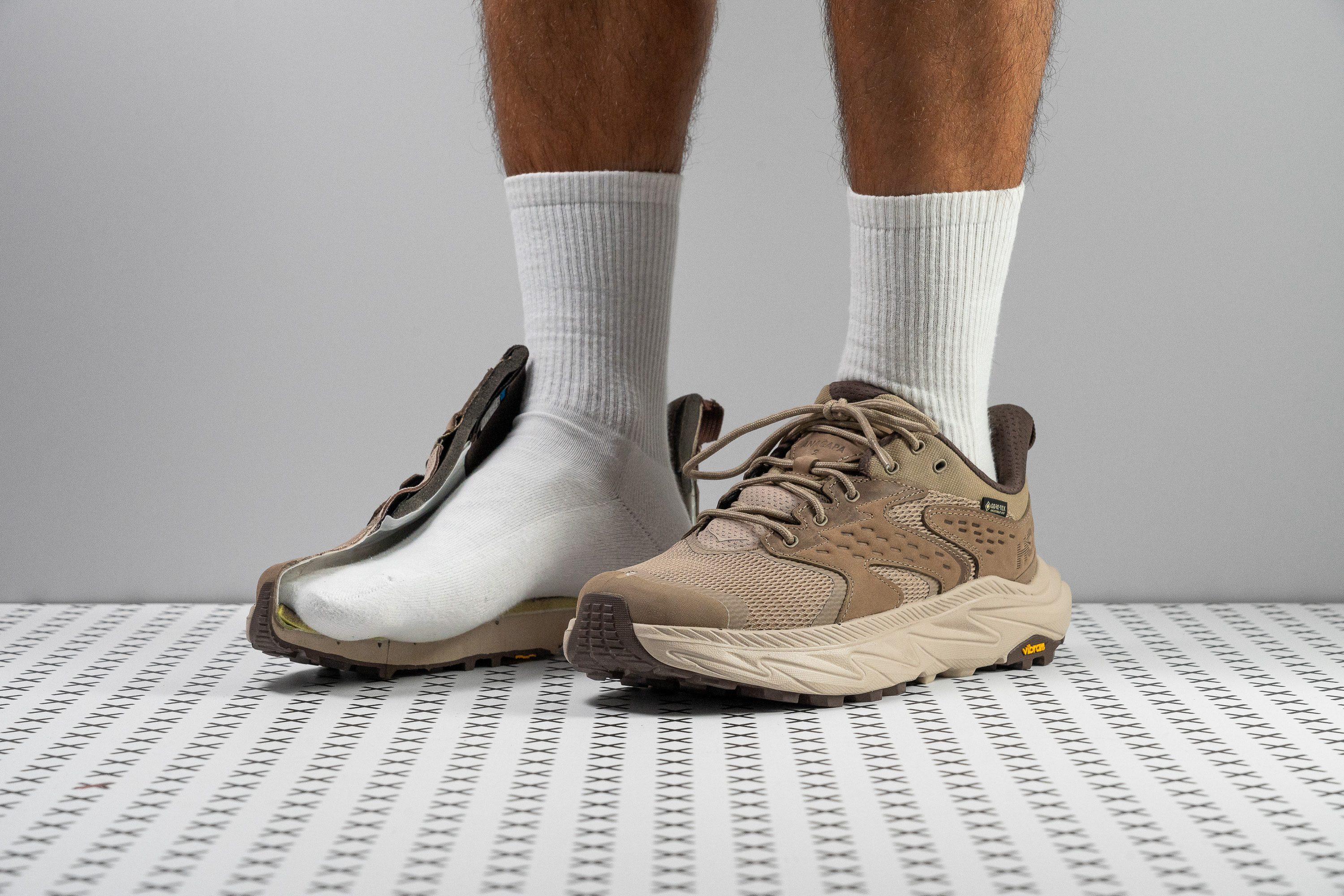Our verdict
- Top pick in hiking shoes with the best shock absorption
Pros
- Fantastic balanced cushioning for long hikes
- Excellent protection from impact, rocks, and trail debris
- Excepitional side-to-side containment and wide platform
- Perfect grip on various terrain
- Durable Vibram rubber
- Effective but lighter-feeling Gore-Tex waterproofing
- High-quality nubuck panels
- True to size
Cons
- Upper mesh is not very durable
- Loses midsole softness in cold
Audience verdict
- Top 12% most popular hiking shoes
Comparison
The most similar hiking shoes compared
+ + Add a shoe | |||||
|---|---|---|---|---|---|
| Audience score | 78 Good! | 82 Good! | 86 Great! | 73 Good! | |
| Price | $180 | $190 | $160 | $165 | |
| Trail terrain | ModerateTechnical | Light | Technical | ModerateTechnical | |
| Shock absorption | High | High | Low | - | |
| Energy return | Moderate | High | Moderate | - | |
| Weight lab Weight brand | 14.1 oz / 400g 15.3 oz / 434g | 12 oz / 339g | 15.9 oz / 452g 15.9 oz / 452g | 15.6 oz / 441g 17.2 oz / 487g | |
| Lightweight | ✓ | ✓ | ✗ | ✗ | |
| Breathability | Warm | Warm | Warm | Moderate | |
| Use | Day HikingLight HikingSnow | Day HikingSpeed HikingLight HikingUrban hiking | Day HikingSnow | Day HikingLight HikingUrban hikingSnow | |
| Orthotic friendly | ✓ | ✓ | ✓ | ✓ | |
| Drop lab | 12.0 mm | 10.2 mm | 10.9 mm | 10.0 mm | |
| Size | Slightly large | Slightly small | Half size small | True to size | |
| Midsole softness | Soft | Firm | Firm | Soft | |
| Difference in midsole softness in cold | Big | Normal | Big | Small | |
| Torsional rigidity | Stiff | Stiff | Moderate | Stiff | |
| Heel counter stiffness | Flexible | Moderate | Moderate | Moderate | |
| Stiffness | Stiff | Stiff | Moderate | Stiff | |
| Outsole hardness | Average | Hard | Average | Average | |
| Waterproofing | Waterproof | Waterproof | Waterproof | Waterproof | |
| Material | Mesh | - | LeatherMesh | - | |
| Season | Winter | Winter | Winter | Winter | |
| Toebox durability | Decent | Decent | - | Very good | |
| Heel padding durability | Bad | Bad | - | Bad | |
| Outsole durability | Decent | Good | - | Decent | |
| Width / fit | Narrow | Medium | Medium | Wide | |
| Toebox width | Narrow | Medium | Medium | Wide | |
| Lug depth | 4.9 mm | 2.3 mm | 4.8 mm | 4.0 mm | |
| Heel stack lab | 36.0 mm | 39.4 mm | 33.2 mm | 33.0 mm | |
| Forefoot | 24.0 mm | 29.2 mm | 22.3 mm | 23.0 mm | |
| Widths available | NormalWide | Normal | NormalWide | Normal | |
| Technology | Gore-TexVibram | - | Gore-TexVibram | Gore-TexVibram | |
| Heel tab | Finger loop | Finger loop | Finger loop | Finger loop | |
| Removable insole | ✓ | ✓ | ✓ | ✓ | |
| Ranking | #30 Bottom 14% | #25 Bottom 28% | #14 Top 40% | #33 Bottom 5% | |
| Popularity | #4 Top 12% | #15 Top 43% | #6 Top 18% | #33 Bottom 5% |
Who should buy
We believe that the Hoka Anacapa 2 Low GTX must be on your radar if you value the following features in your hiking shoes:
- plenty of cushioning for comfort and underfoot protection
- unusually wide and supportive platform
- high-class Gore-Tex waterproofing
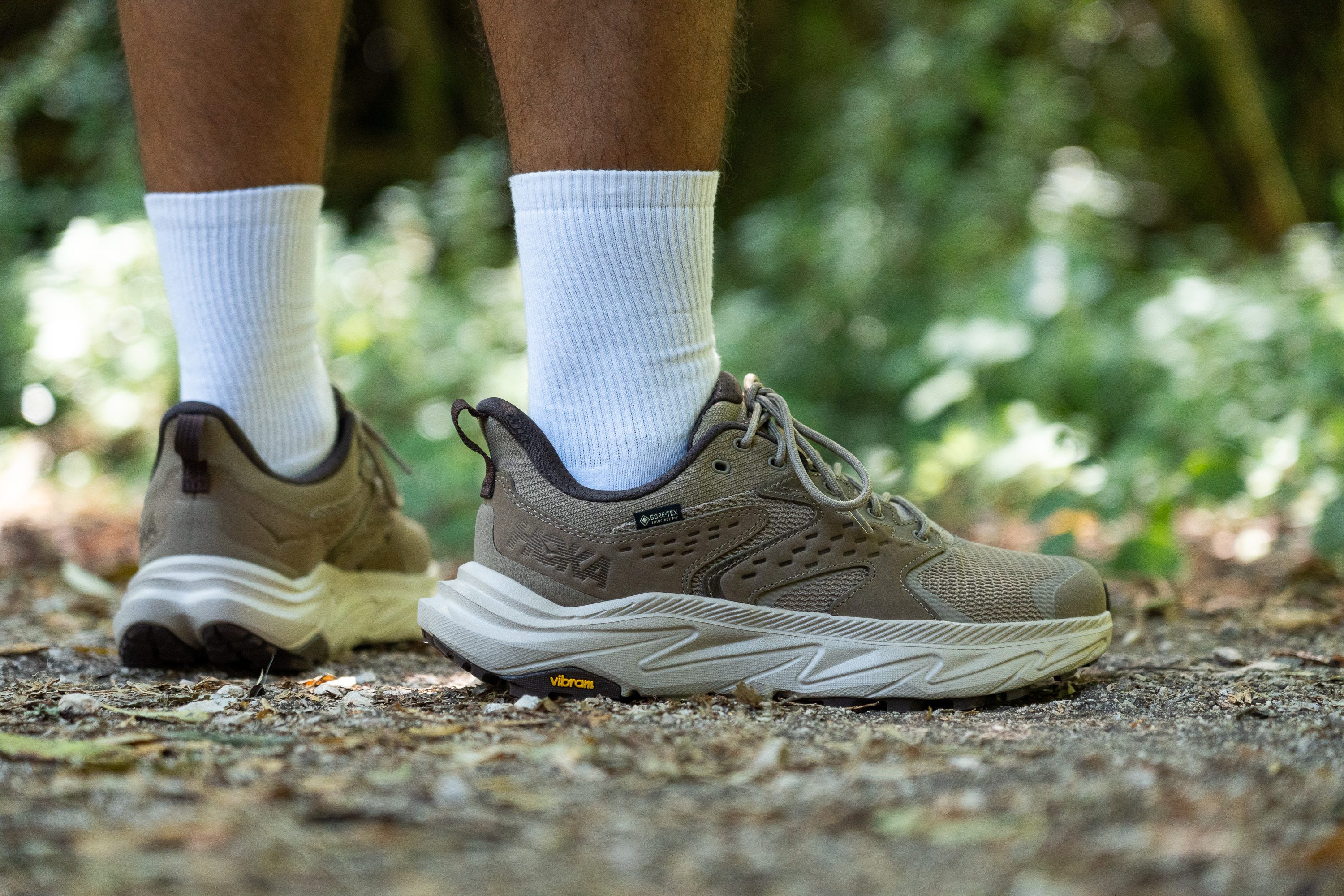
Who should NOT buy
Although we didn't find any glaring issues with the Anacapa 2 Low GTX, it could happen that the shoe simply doesn't meet your individual needs. Luckily, the Hoka Anacapa series offers several options for you to choose from:
- Anacapa Breeze Low (breathable, non-waterproof shoe for summer)
- Anacapa Breeze Mid (breathable, non-waterproof shoe for warm season)
- Anacapa 2 Mid GTX (ankle-high, waterproof boot for cold and wet season)
You might as well consider shoes from other brands in our guide on the best waterproof hiking shoes.
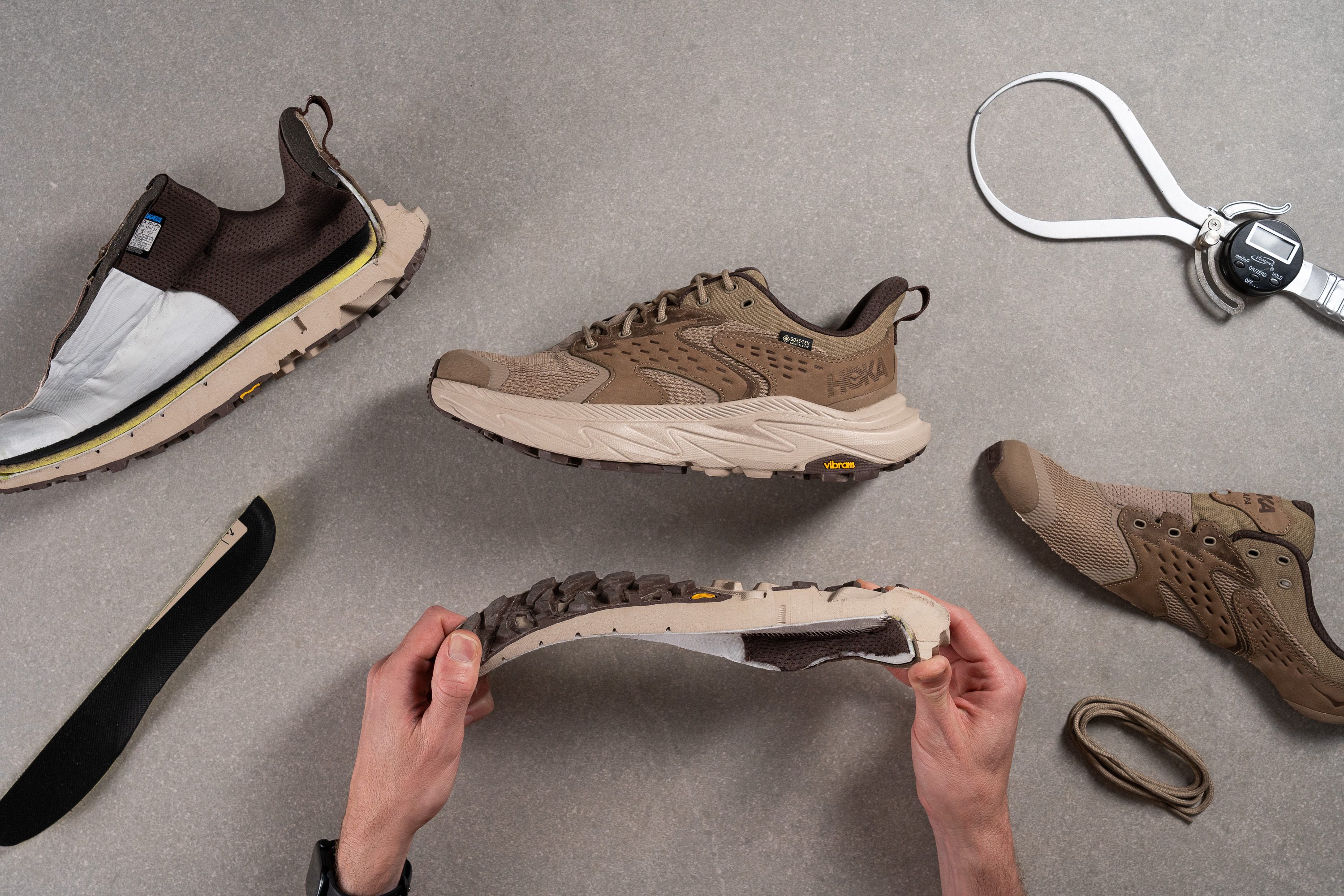
Cushioning
Shock absorption
If you prefer abundant cushioning and don't mind feeling a bit isolated from the trail, the Anacapa 2 is one of the best options for the job.
With an above-average shock absorption of 118 SA, this HOKA shoe offers more impact protection than a typical hiking shoe. It reduces impact on the joints on hard-packed terrain and protects the foot from sharp debris on obstacle-laden stretches. Either way, the Anacapa feels comfortable and minimizes fatigue on long hikes.
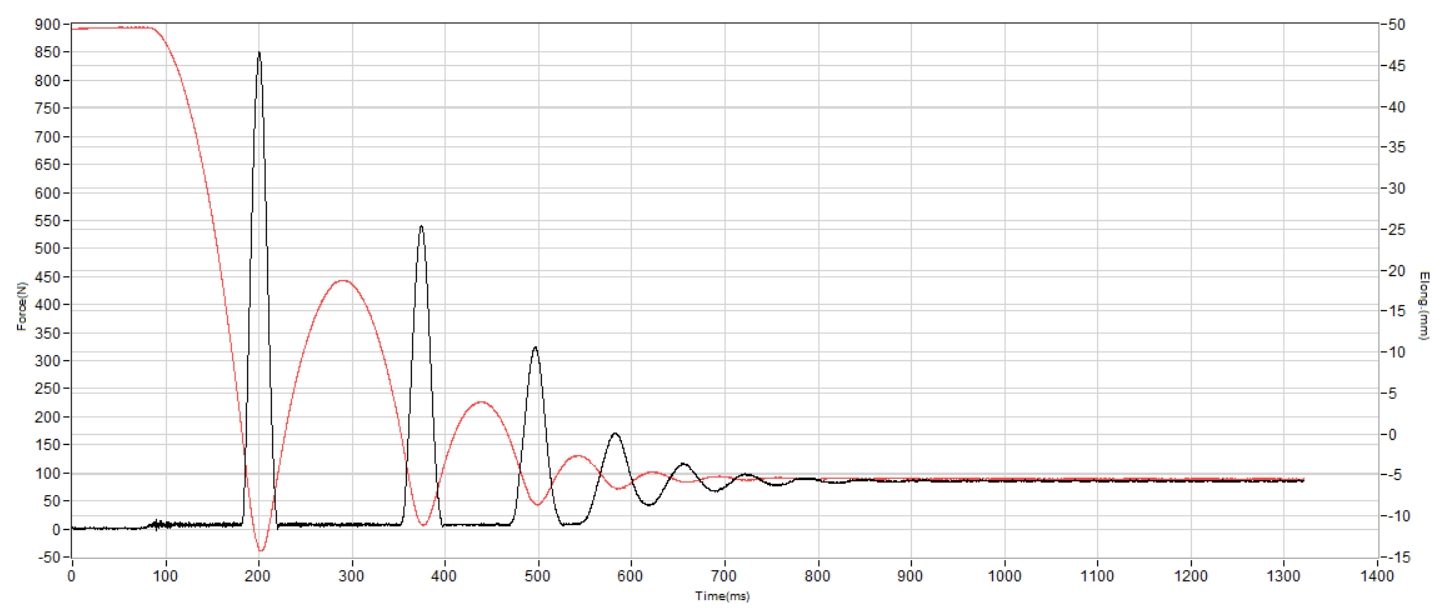
| Hoka Anacapa 2 Low GTX | 118 SA |
| Average | 104 SA |
Energy return
The Anacapa 2 Low GTX doesn't feel as lively and responsive as some of the other max-cushioned hiking shoes we tested (like the Altra Olympus 6 Hike). However, it feels more stable with a moderate energy return of 47%.
| Hoka Anacapa 2 Low GTX | 46.8% |
| Average | 50.2% |
Heel stack
Measuring its heel stack with a caliper, we got the same reading as in the original Anacapa - 36.0 mm. A few millimeters thicker than average, it is among the thickest-foamed hikers on the market.
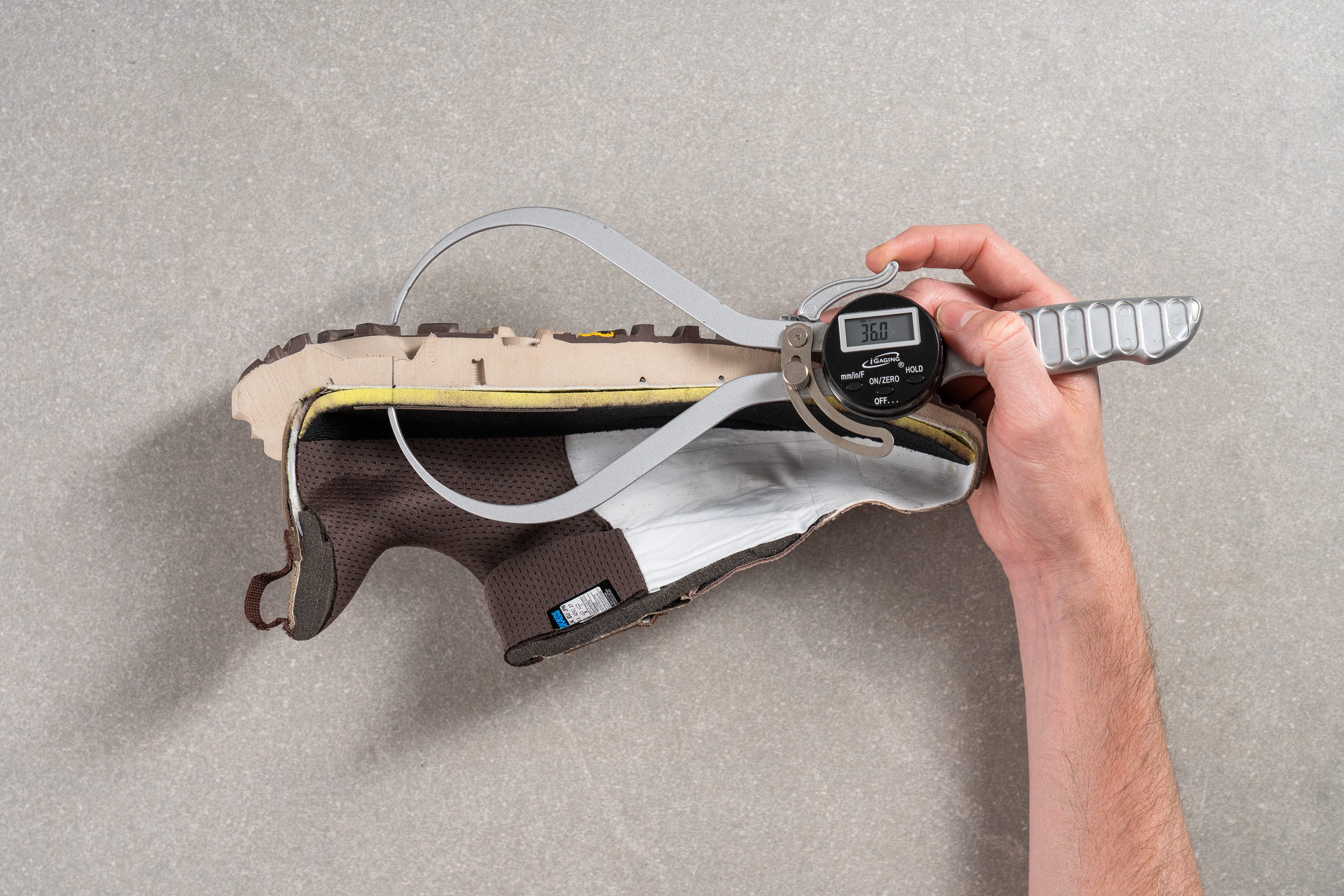
It swallowed hard rocks and sharp roots like a hungry monster allowing us to make confident steps and enjoy the views without thinking too much about obstacles underfoot.
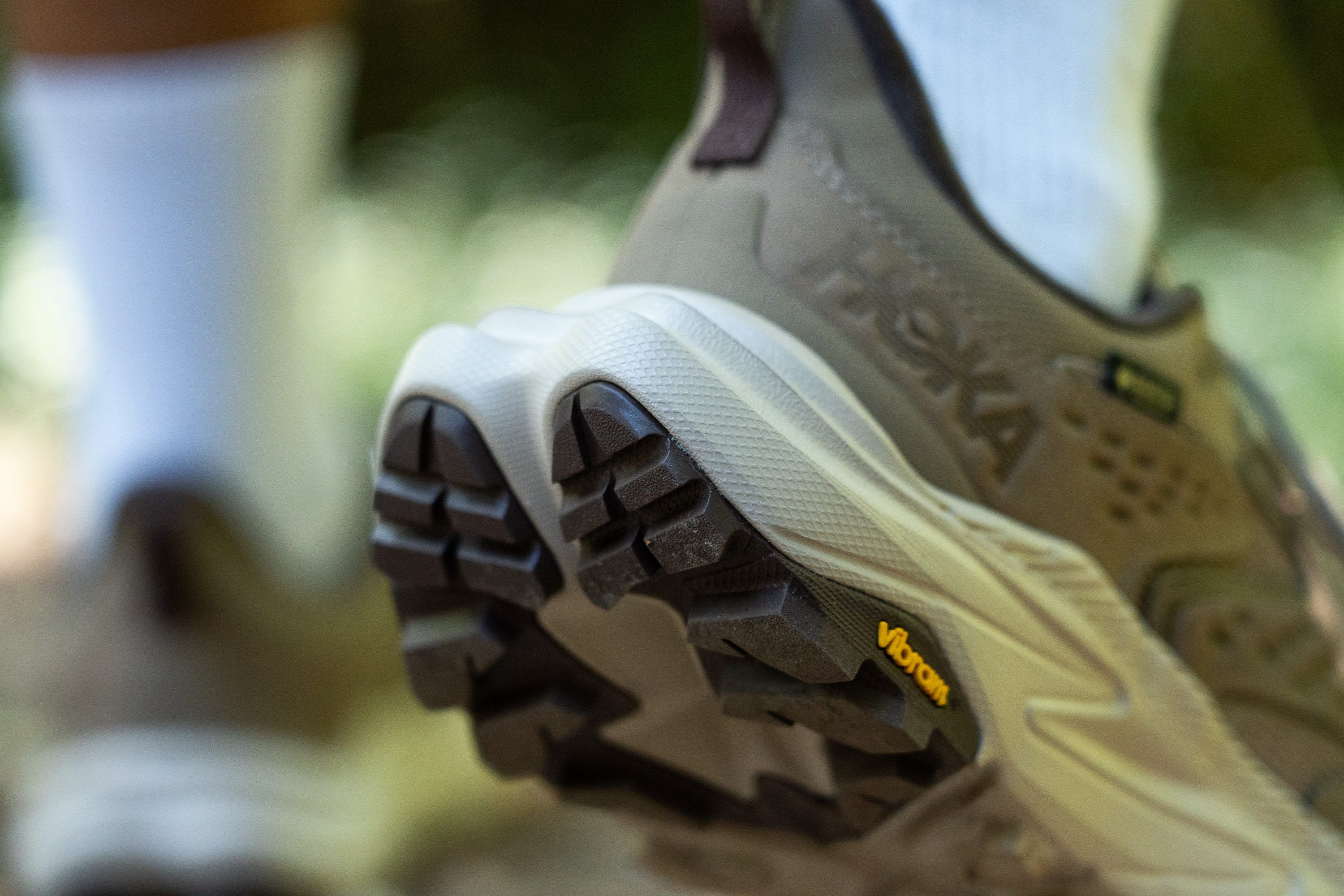
Speaking of swallowing... Just like its predecessor, the Anacapa 2 features Hoka's signature SwallowTail heel design. If you are new to this footwear brand, expect a short adjustment period. But once you are used to it, the shoe treats you to very smooth landings and heel-to-toe transitions.
| Hoka Anacapa 2 Low GTX | 36.0 mm |
| Average | 32.8 mm |
Forefoot stack
As expected, the Anacapa's cushioning is also pretty generous in the forefoot section. We measured the stack height here at 24.0 mm which is a few millimeters taller than average.
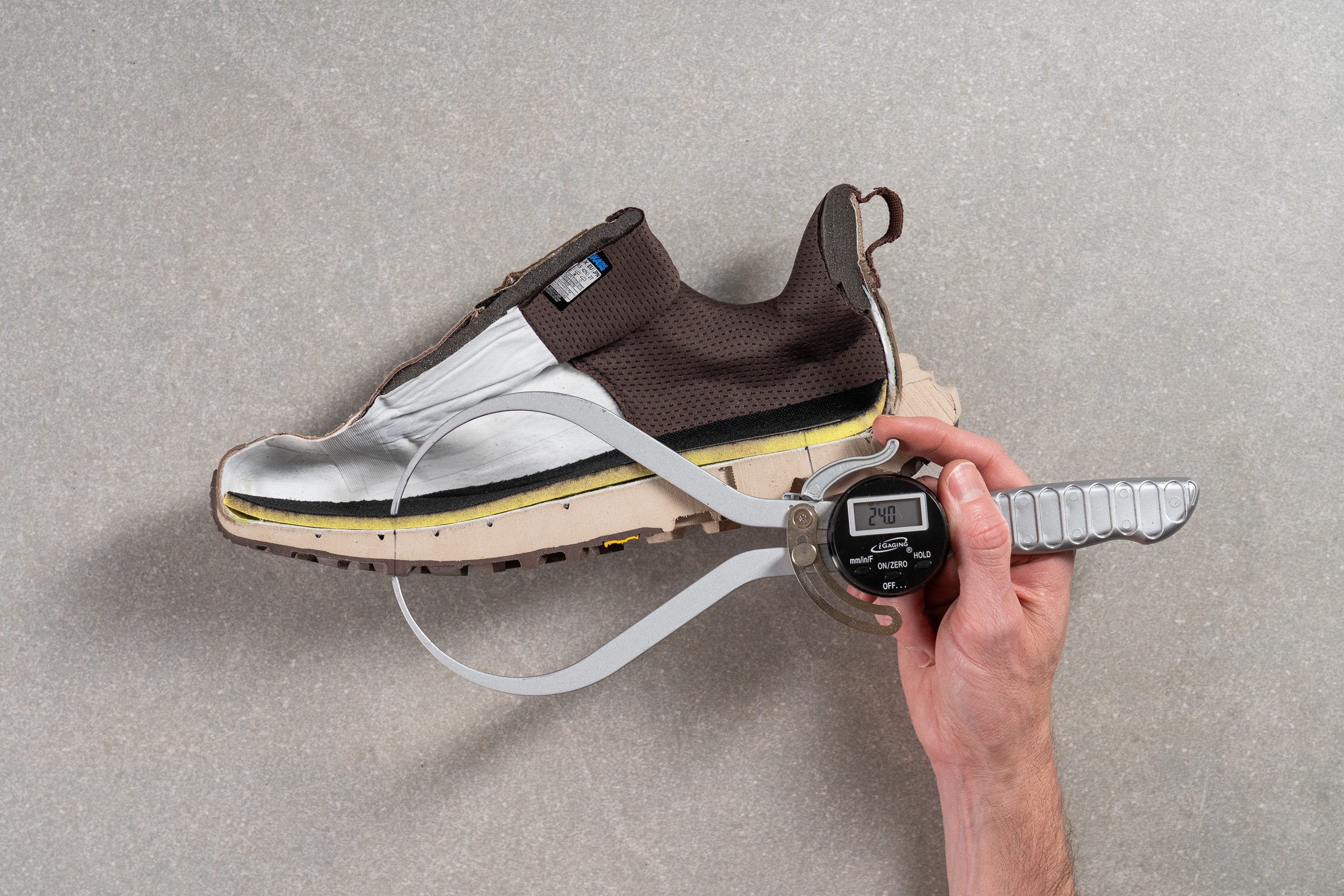
It made us feel comfortably protected on rocky ascents where our forefoot dominated the steps.
| Hoka Anacapa 2 Low GTX | 24.0 mm |
| Average | 22.0 mm |
Drop
The difference in stack heights resulted in a heel-to-toe drop of 12.0 mm which is notably steeper than the claimed 8 mm.
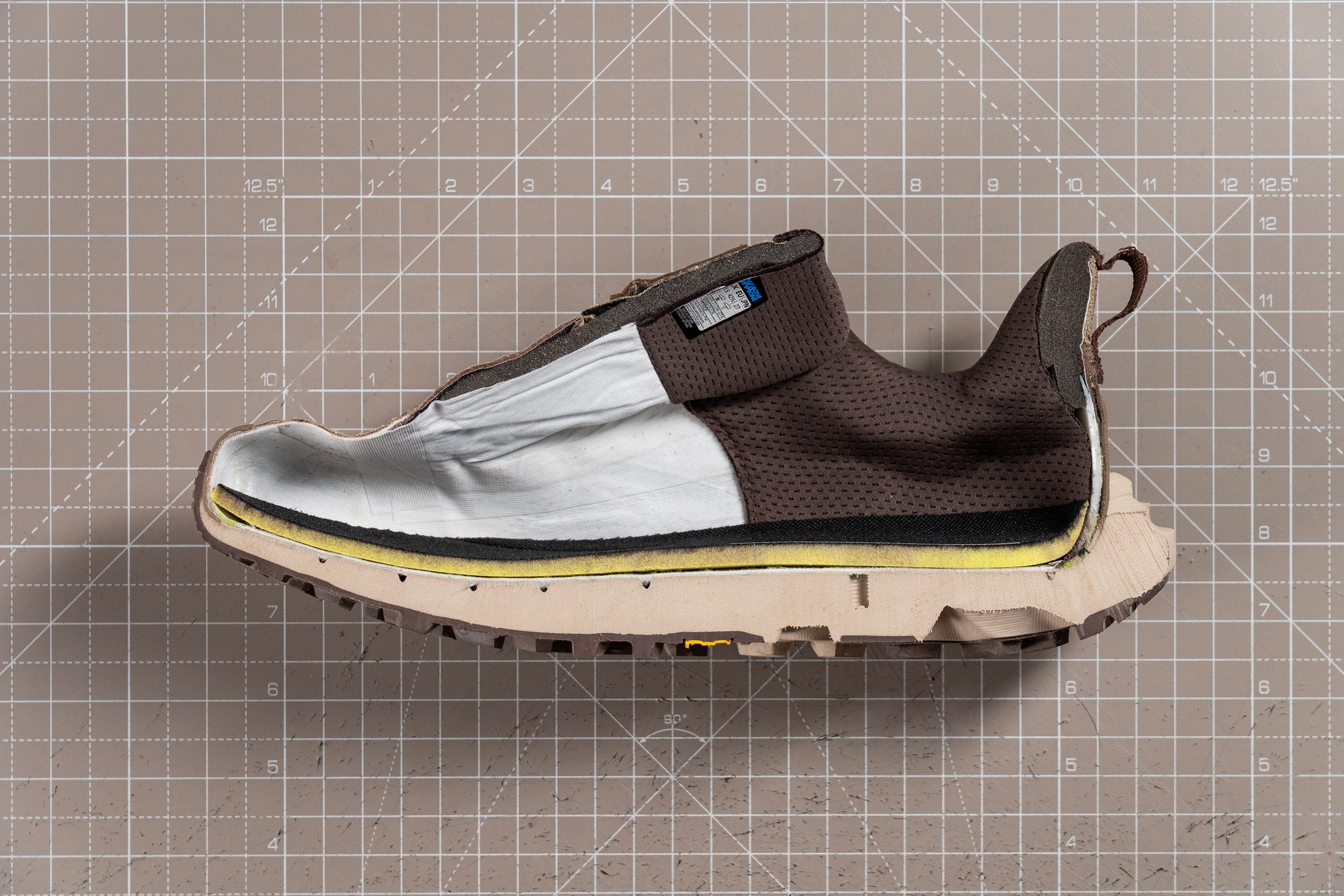
But the good news is that you will most likely not feel the difference unless you are very particular about the drop in your footwear. In the end, you still get plenty of cushioning and support in the rearfoot which keeps your heels comfortable and takes the pressure off the Achilles, especially if a heavy backpack is involved.
| Hoka Anacapa 2 Low GTX | 12.0 mm |
| Average | 10.7 mm |
Midsole softness
According to Hoka, the Anacapa 2 Low GTX uses a balanced type of cushioning that is neither too plush nor too firm.
Our personal experience and durometer measurements confirm that statement. With an HA reading of 22.1, the shoe's CMEVA foam turns out to be 25% softer than average but it doesn't fall into the plush category which starts below 20 HA.
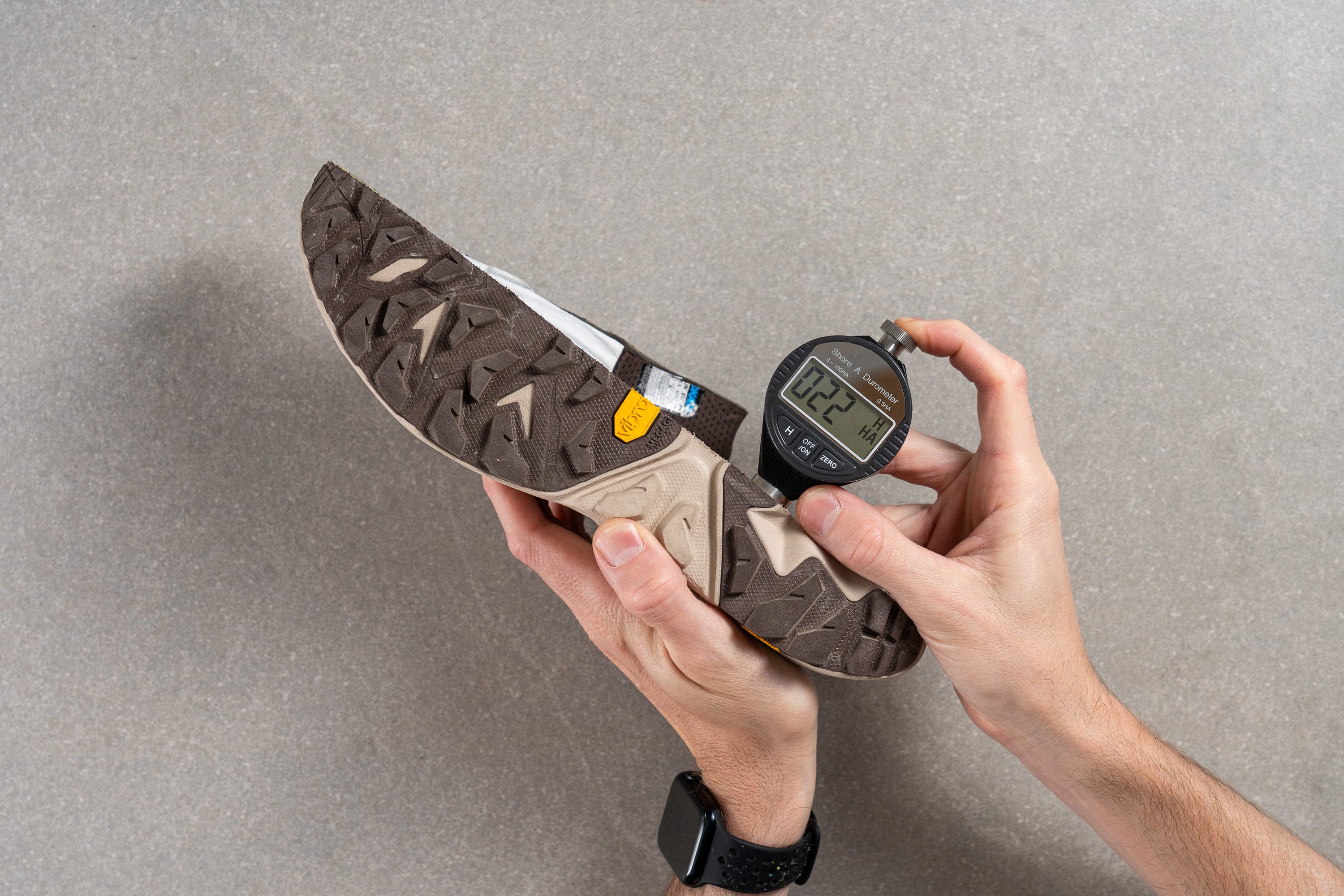
Even though there is a good squish to it, the shoe's midsole never felt mushy or unstable. There is enough firmness to make it feel predictable on the trail.
However, we wouldn't recommend this max-cushioned Hoka shoe for technical situations where you need a firmer, more grounded, and narrower platform to navigate the rocks.
| Hoka Anacapa 2 Low GTX | 22.1 HA |
| Average | 27.0 HA |
Size and fit
Size
Hoka Anacapa 2 Low GTX fits slightly large (62 votes).
Internal length
| Hoka Anacapa 2 Low GTX | 270.0 mm |
| Average | 268.7 mm |
Width / Fit
On foot, the Hoka Anacapa 2 Low GTX felt more close-fitting than the other hiking shoes we tested in a men's US size 9.
To check if that was indeed the case, we filled the shoe's interiors with a custom gel to achieve a mold of its shape.
Measuring the mold at its widest with a caliper, we got 90.08 mm. This is notably narrower than the average of hiking shoes.
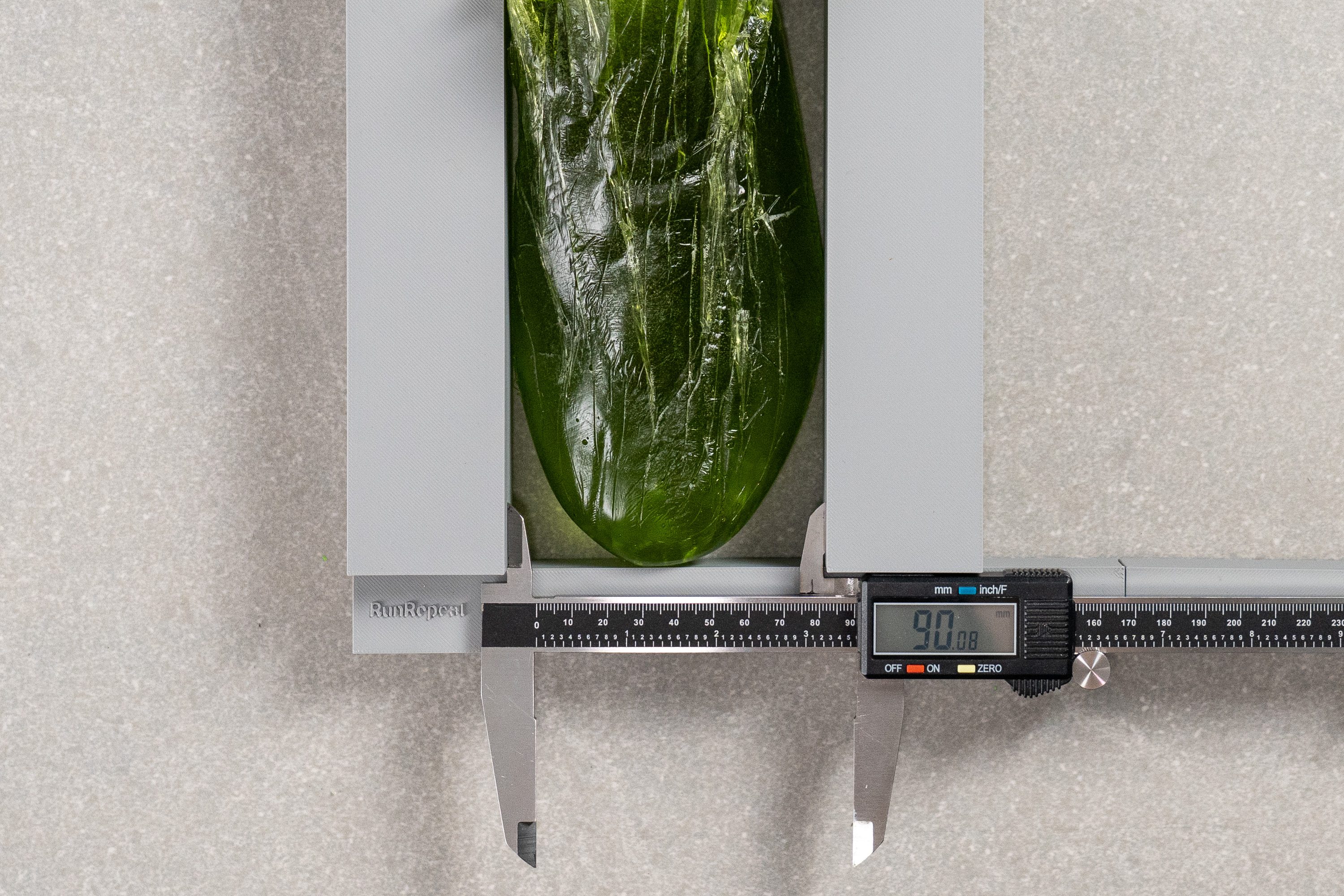
Thus, we recommend that hikers with wide feet and bunions get this Hoka shoe in a wide-width option. According to Hoka's width chart, the wider variant should add as much as 8 mm in the men's shoe (2E Wide) and 6 mm in the women's version (D Wide).
| Hoka Anacapa 2 Low GTX | 90.1 mm |
| Average | 94.1 mm |
Toebox width
On the bright side, the Anacapa 2 Low GTX did not feel constricting in our regular width thanks to its moderate taper angle. In other words, it has a fairly rounded toebox shape that accommodates all five toes (and doesn't ignore pinkies!).
At the big toe mark, our caliper showed a slightly smaller-than-average reading of 69.51 mm. However, we found it to be just fine for medium-width feet.
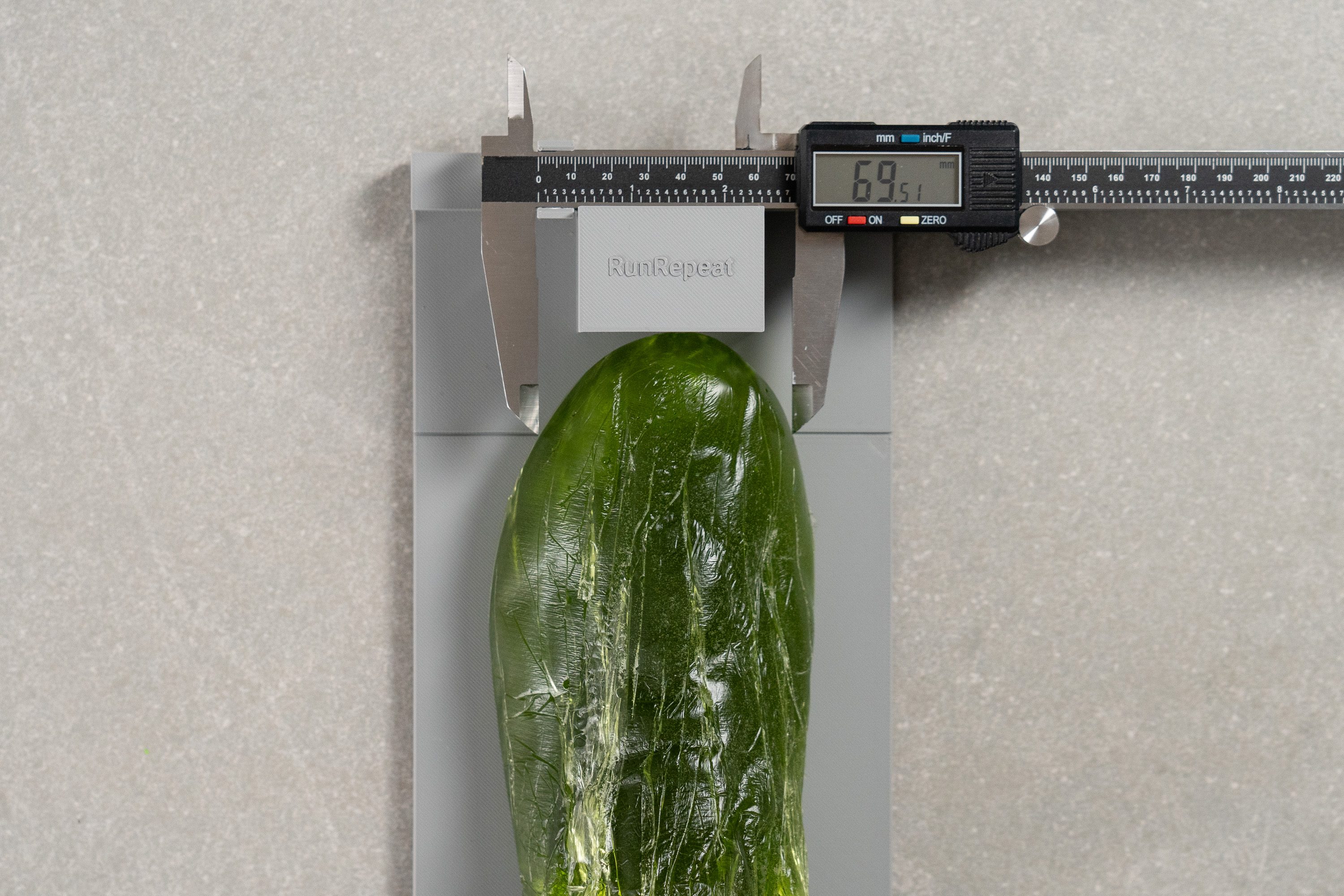
| Hoka Anacapa 2 Low GTX | 69.5 mm |
| Average | 72.5 mm |
Toebox height
A generous toebox height of 28.4 mm made this Hoka shoe feel accommodating enough despite the narrower forefoot dimensions.
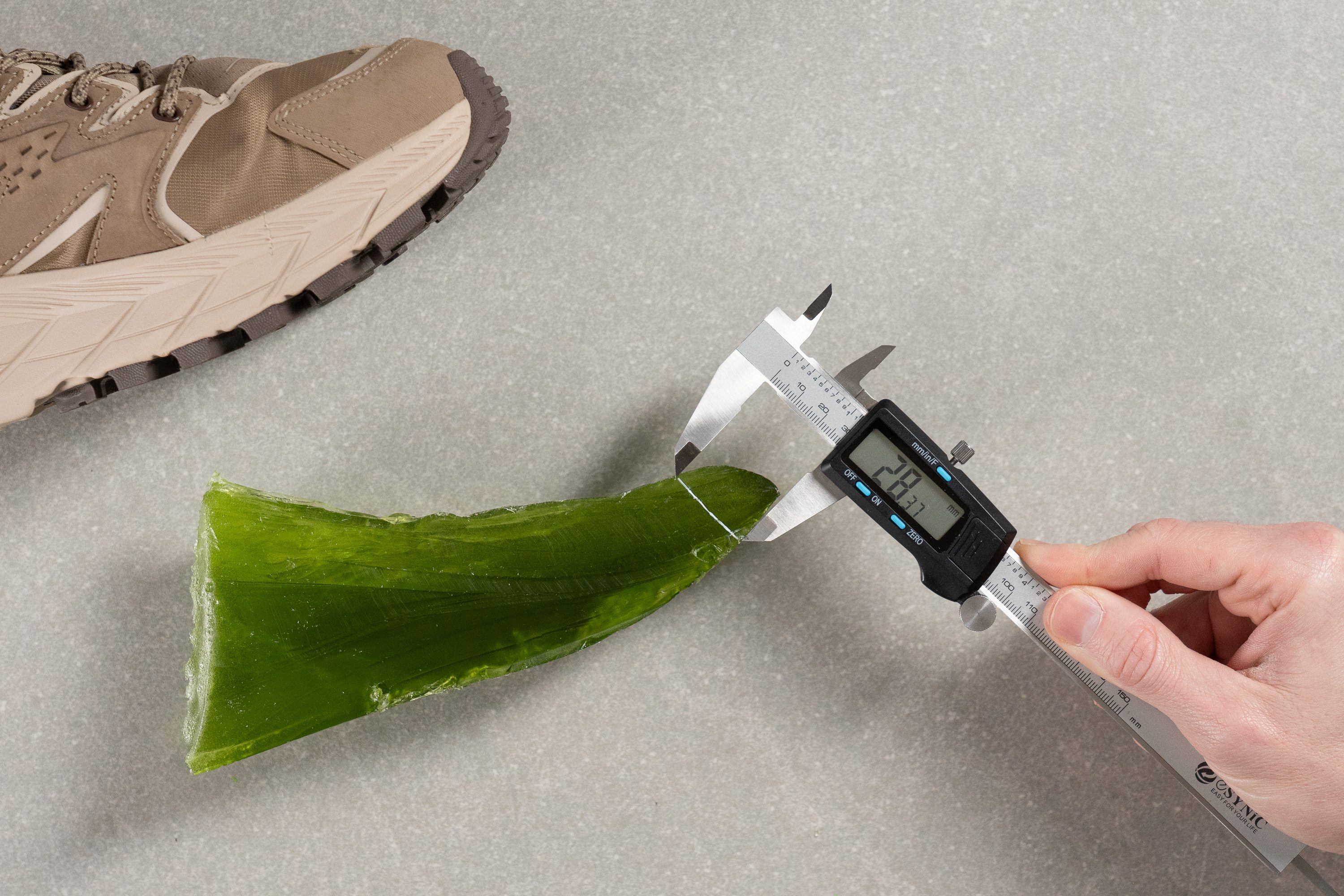
| Hoka Anacapa 2 Low GTX | 28.4 mm |
| Average | 28.0 mm |
Laces
The Anacapa 2 Low GTX comes with a set of round laces and an extra pair of eyelets to customize the fit.
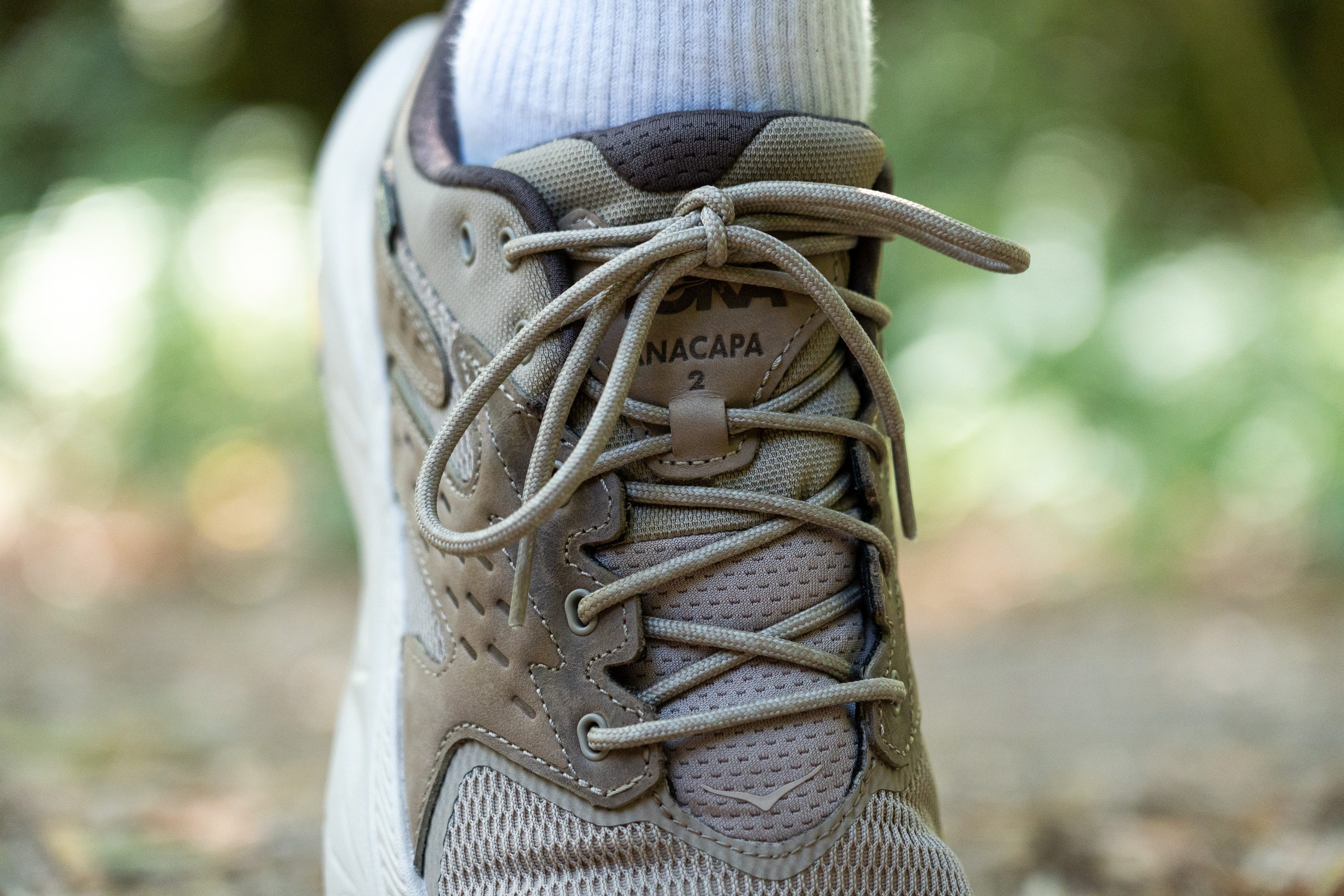
We recommend making a double-knot because these laces do tend to loosen up.
Traction / Grip
Lug depth
Studded with 5-mm lugs, this HOKA shoe turned out to be a great all-rounder for various trail surfaces. We were able to trudge through loose terrain, step on logs and moss, and even brake on steep descents quite confidently.
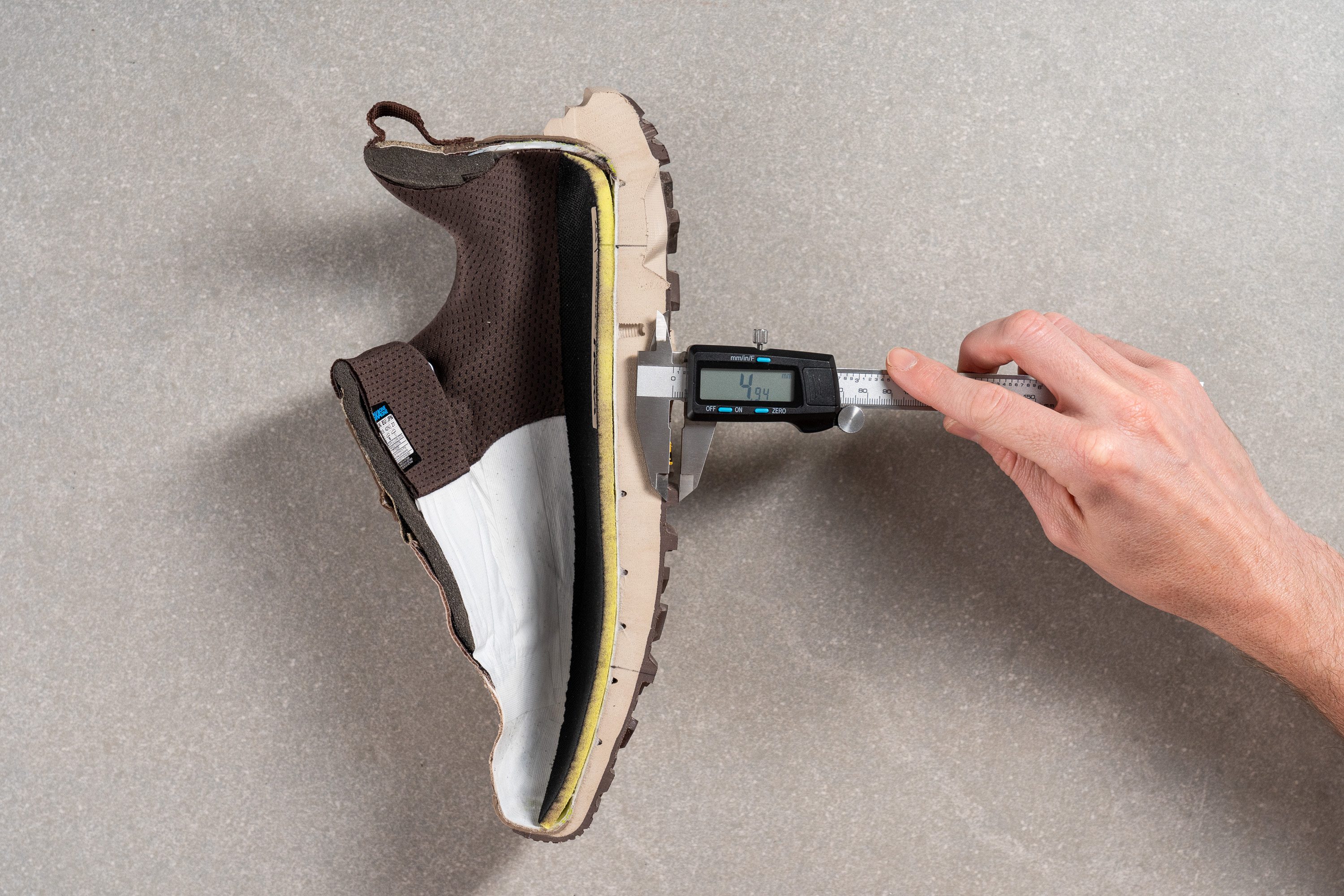
| Hoka Anacapa 2 Low GTX | 4.9 mm |
| Average | 4.0 mm |
Outsole design
The Anacapa 2 Low GTX features large chevron-shaped lugs that inspire confidence on hilly terrain. These lugs are decently spaced out to help with mud-shedding on the dirty patches.
There is no heel brake in this HOKA shoe, but you can trust the slanted lugs in its heel for added grip on the descents.
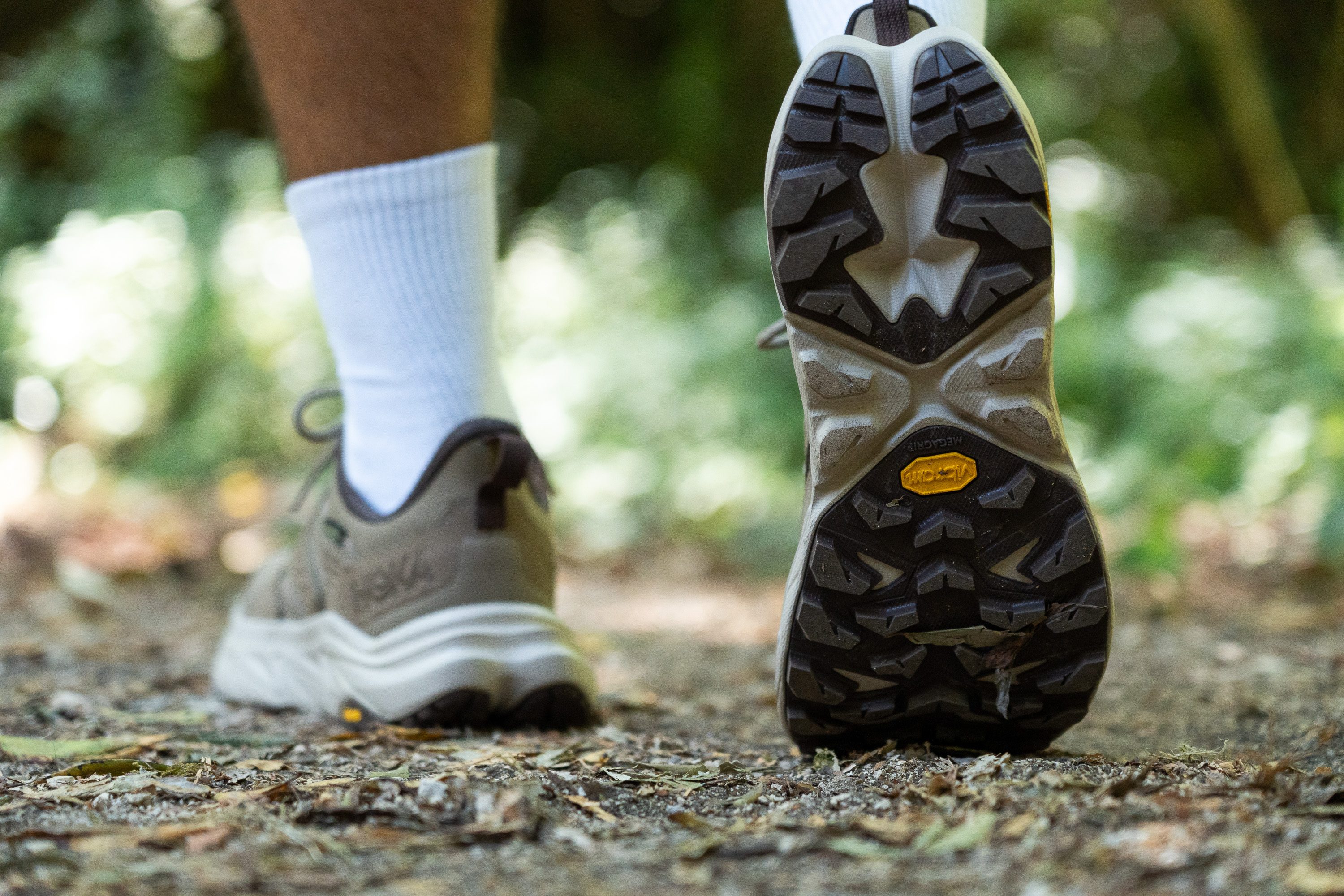
Flexibility / Stiffness
With its considerable helping of foam, the Hoka Anacapa 2 Low GTX proved to be equally resistant to forefoot bending as its high-collar counterpart, the Anacapa 2 Mid.
Bending the shoe to a 30-degree angle, our flexibility machine showed that it required 29.0N which is quite a lot for a hiking shoe.
The Anacapa 2 Low didn't feel very agreeable but it did feel quite supportive but not letting too much foot flexion on uneven terrain. That, on top of abundant cushioning, did a great job of preventing extreme foot fatigue on all-day hikes.
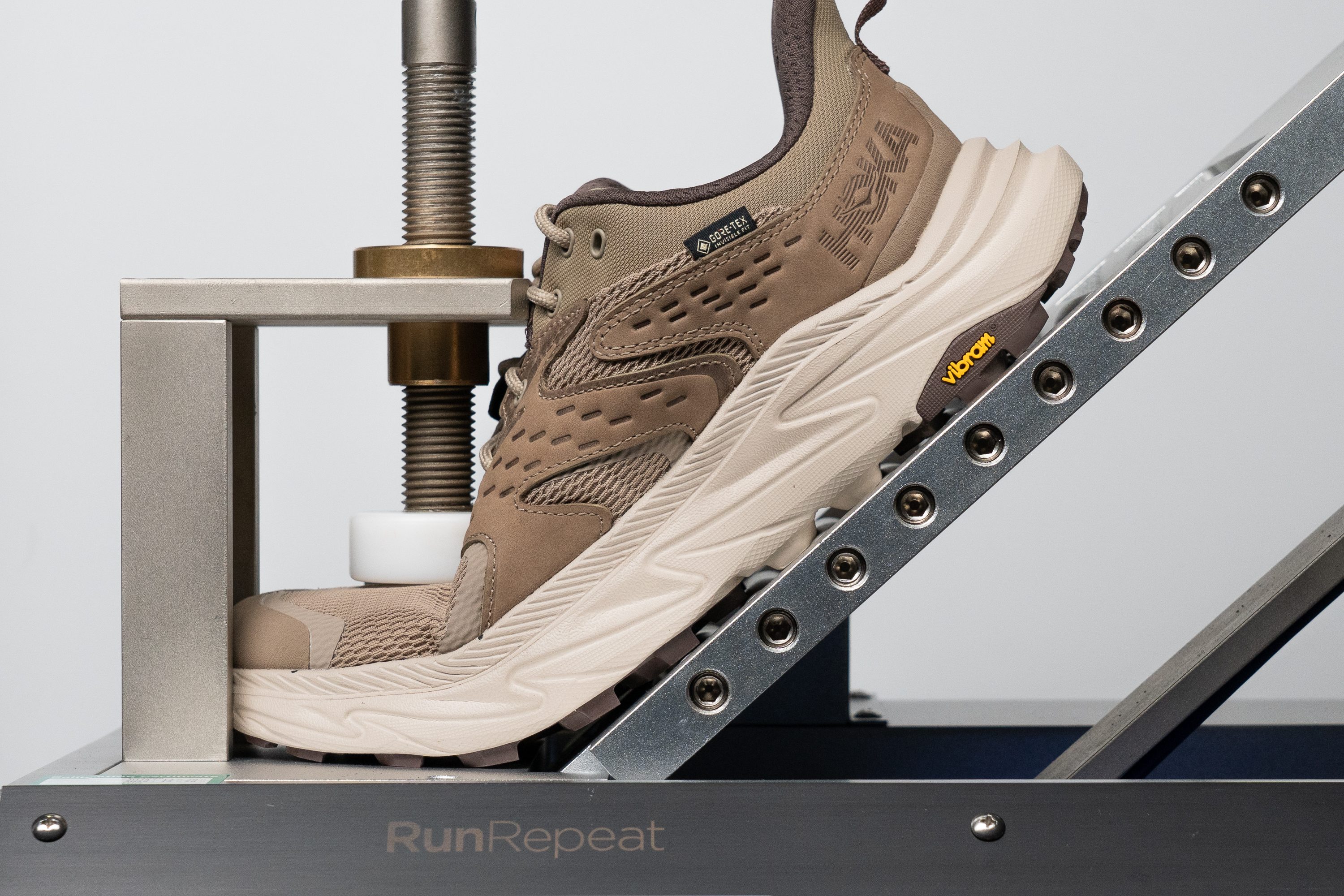
| Hoka Anacapa 2 Low GTX | 29.0N |
| Average | 18.3N |
Stiffness in cold (%)
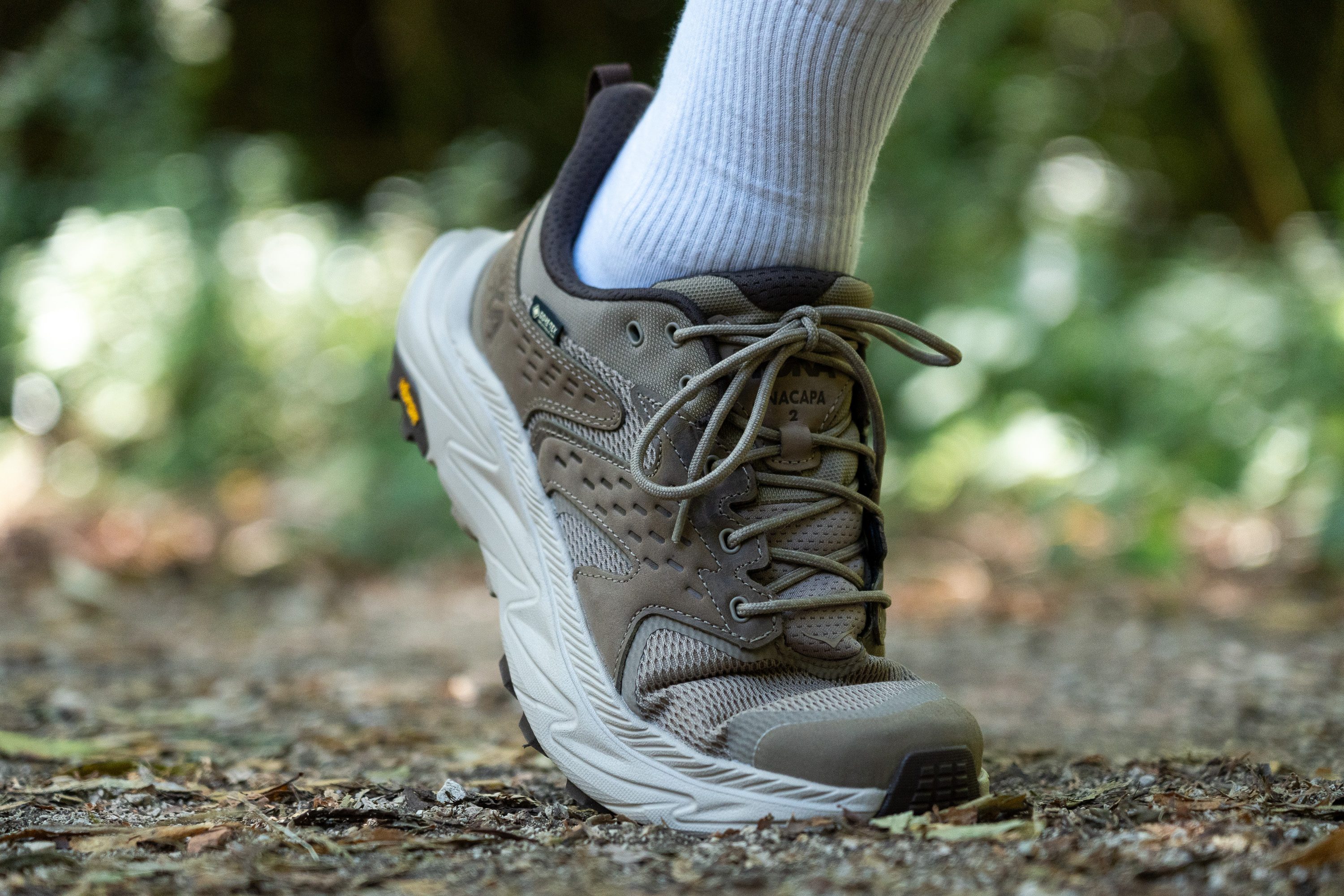
Weight
The Hoka Anacapa 2 Low GTX is not the nimblest of shoes clocking in 14.1 oz (400g) in a men's US size 9.
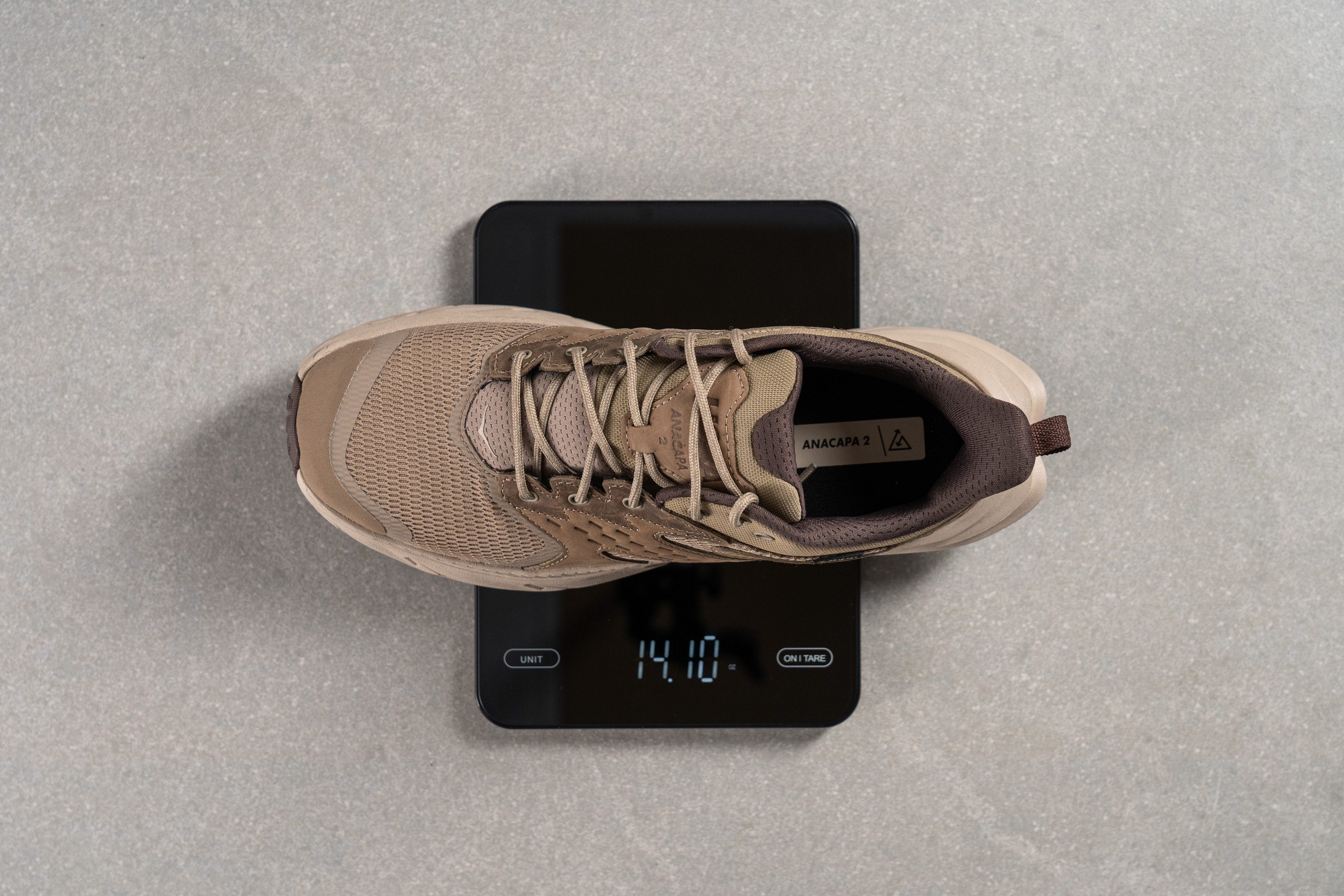
But to be fair, it is only an ounce heavier than the average and we believe that its weight-to-cushioning ratio is quite reasonable. On moderate hikes, we never felt dragged down by this Hoka shoe.
| Hoka Anacapa 2 Low GTX | 14.1 oz (400g) |
| Average | 13.4 oz (380g) |
Breathability
As a waterproof hiking shoe, the airflow is nearly absent inside the Hoka Anacapa 2 Low GTX. As you can see from our smoke-pumping breathability test below, none of the smoke escaped through the shoe's upper material.
Because of no visible signs of ventilation, we rated the shoe's breathability with the lowest possible score - 1 out of 5. But there is something about the GTX membrane of this Hoka shoe that makes it feel slightly airier than the standard GTX...
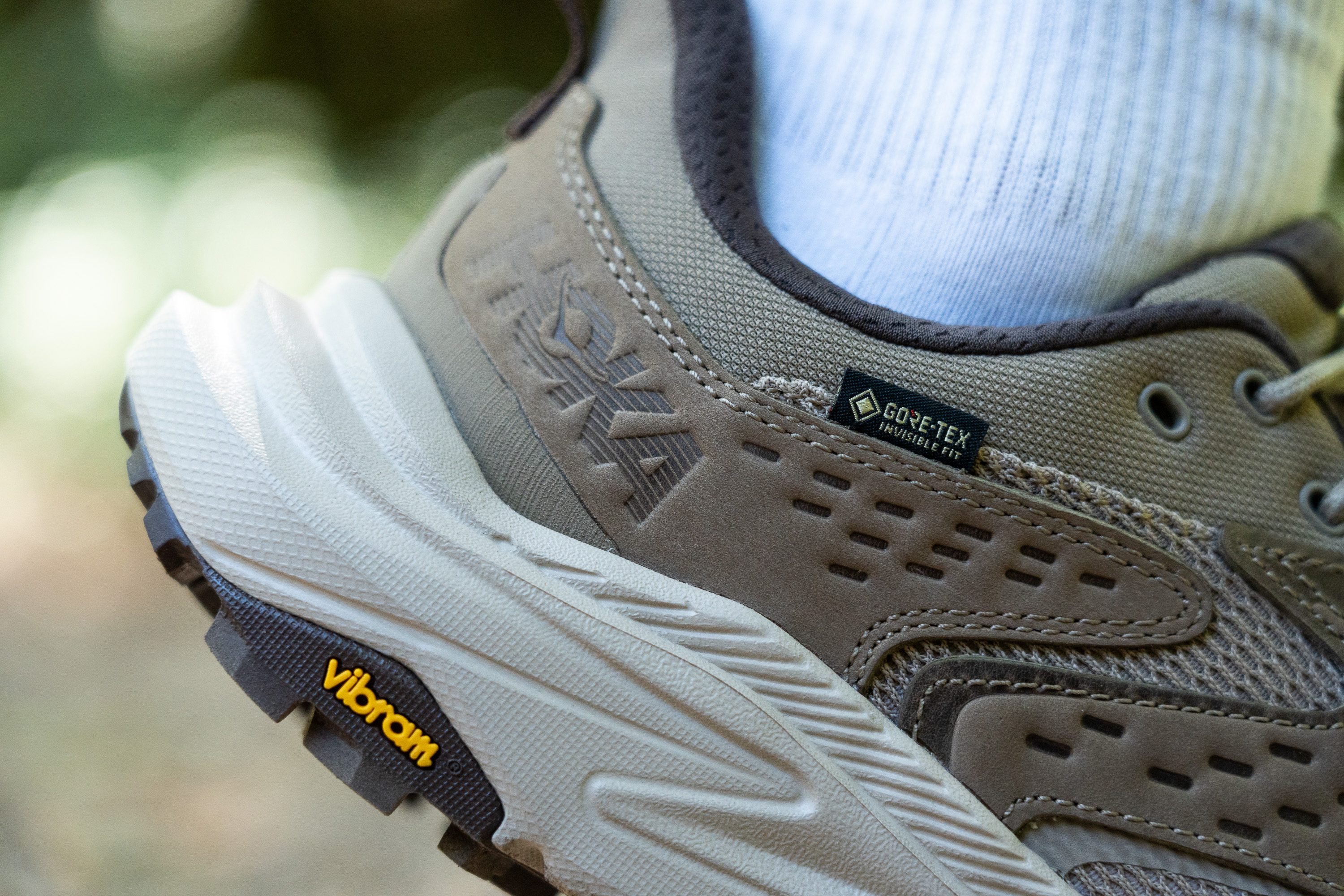
The Anacapa 2 Low GTX features the Invisible Fit version of the Gore-Tex. We found that it is indeed slightly lighter and more breathable than the standard GTX!
Look at the striking difference between the regular GTX on the v1 and the Invisible Fit on the v2 in our transparency tests below!
The latter looked so thin it even made us doubt if we were testing the waterproof version of the Anacapa. But in practice, it proved to be just as warm and watertight as we've come to expect. Just a tab bit lighter on foot.
| Hoka Anacapa 2 Low GTX | 1 |
| Average | 2.4 |
Waterproofing
The Invisible Fit version of the Gore-Tex proved its exceptional waterproofing capacity in our wear tests. Rain or shine, this membrane kept our feet dry when crossing streams and wet grass, as well as getting caught in the rain.
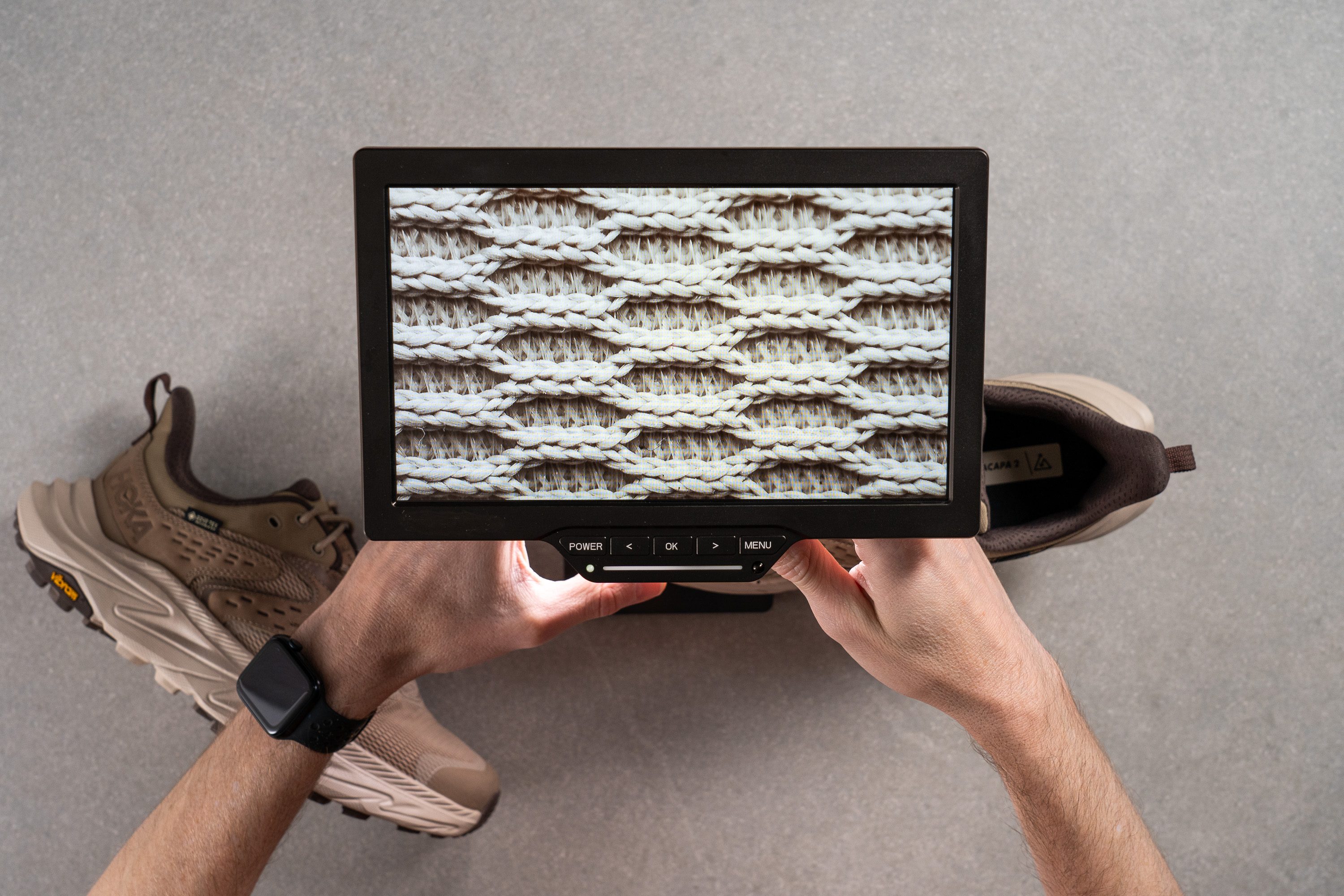
Our initial concerns about the shoe's porous-looking mesh evaporated as soon as we took a closer look at it through our microscope.
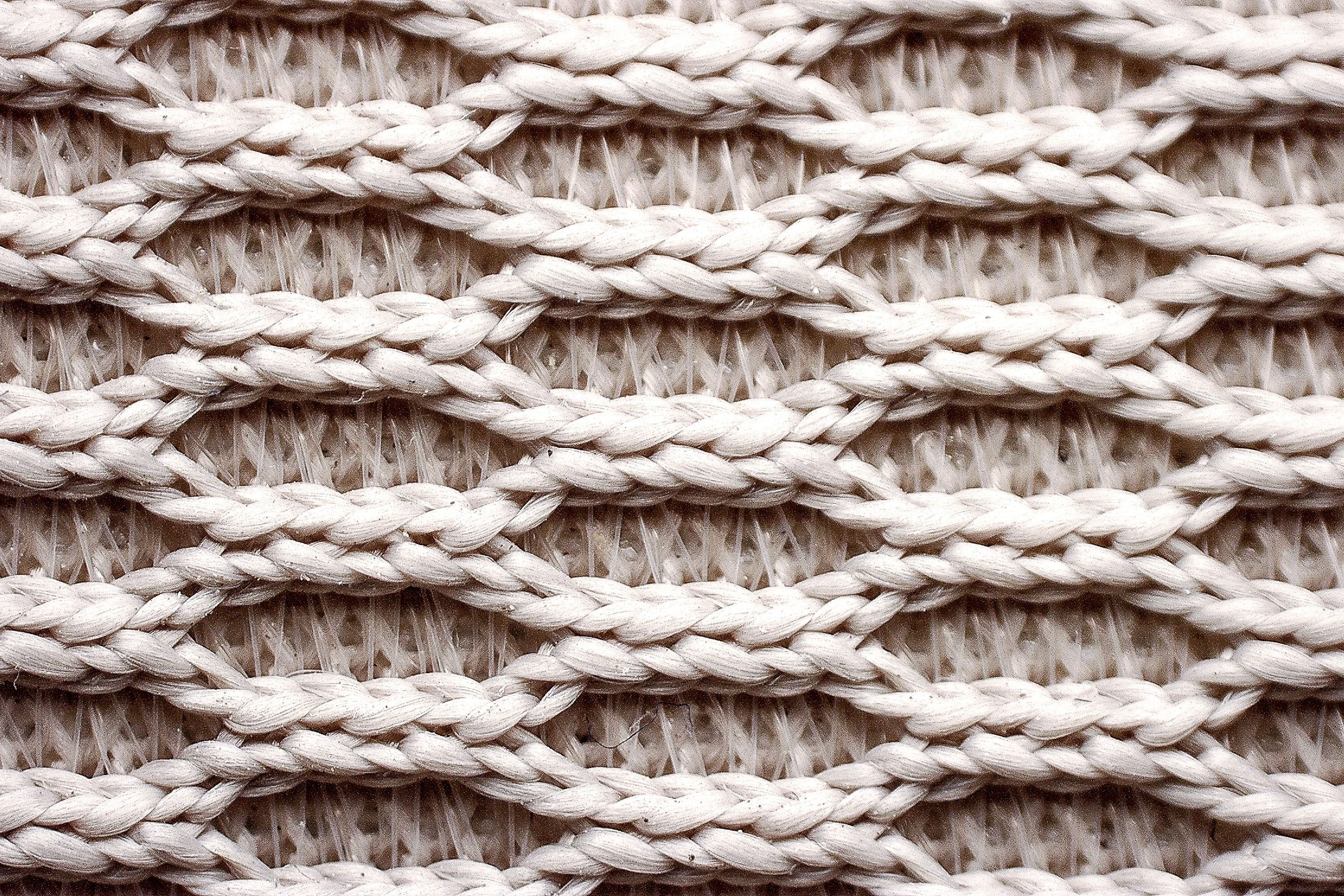
It is a very tightly woven fabric with multiple layers and in-built GTX waterproofing that keeps water at bay very effectively.
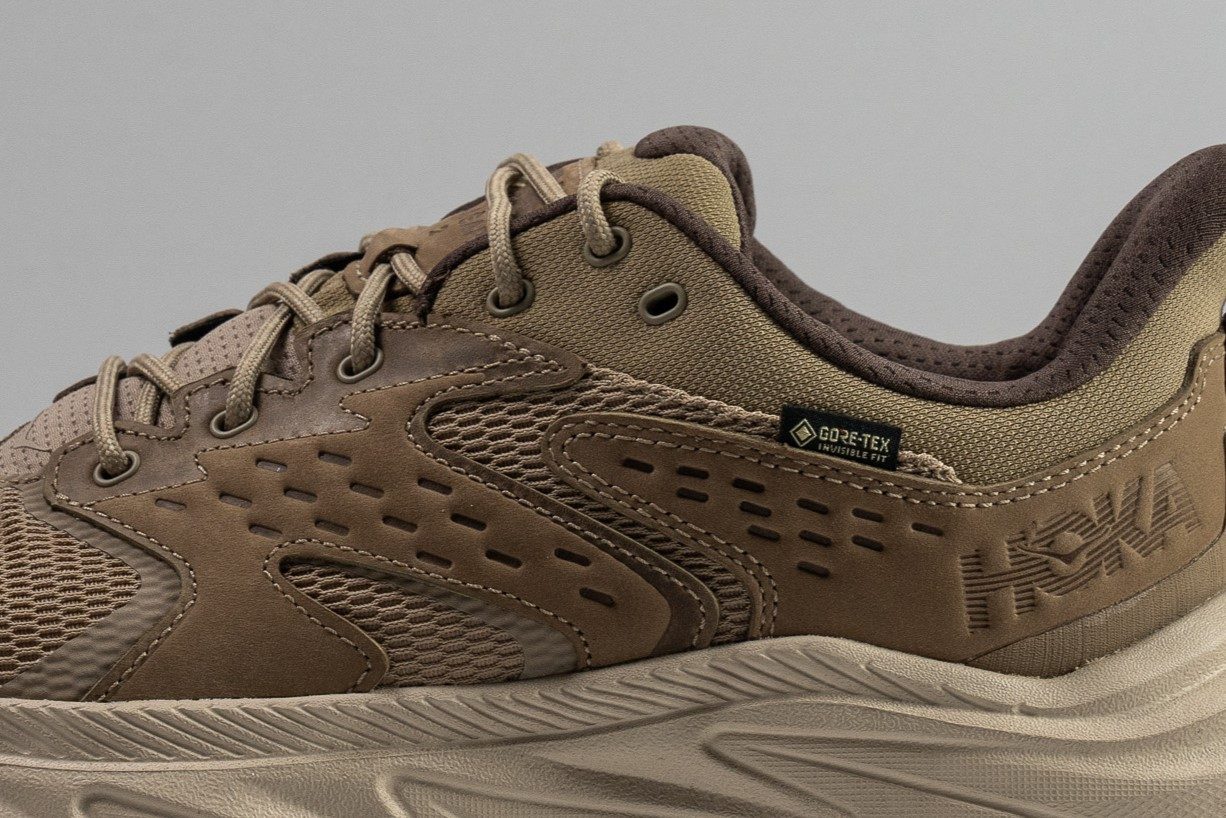
On top of that, the shoe features large panels made of waterproof nubuck leather. Gold-Rated, according to Hoka.
The beauty of the Hoka Anacapa series is that you can opt for an even more protective mid-cut Anacapa 2 GTX boot or ditch waterproofing for breathability in the Anacapa Breeze Low.
Stability
Lateral stability test
Just because it's tall and well-cushioned doesn't mean that the Hoka Anacapa 2 Low GTX can't be stable as a table. Its wide-flanged base and tall sturdy sidewalls generate a good amount of lateral support to prevent the foot from spilling over the shoe edge as you take the hilly path.
Torsional rigidity
Both the midsole and the upper of this Anacapa shoe have enough rigidity to resist twisting. You can see how much force we have to apply in our manual test below to achieve just a slight give.
On a 1-5 stiffness scale, we confidently gave this Hoka shoe a high score of 4. Its torsional rigidity is very close to that of the Anacapa boot!
| Hoka Anacapa 2 Low GTX | 4 |
| Average | 3.7 |
Heel counter stiffness
We also found the Anacapa 2 Low's heel counter to be sufficiently stiff to prevent unwanted shifting and sliding inside the shoe.
To be precise, we assessed its stiffness with a middle-of-the-road score of 3. It doesn't feel like a death grip around your heels but it isn't floppy either - just right for a medium-distance hike with a moderate pack.
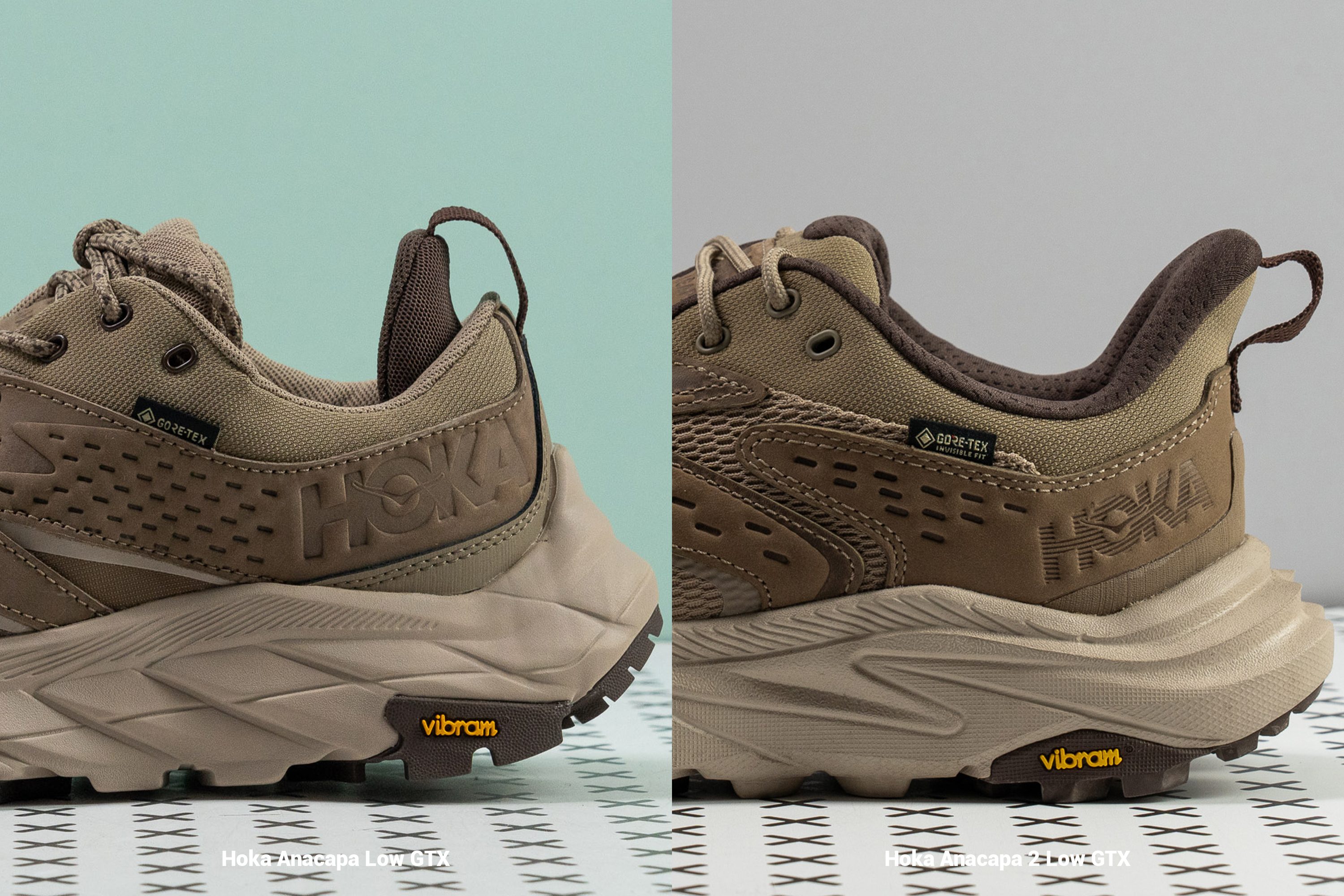
In addition, we are happy to see a design tweak in the heel collar of the second Anacapa Low. It got so much more ergonomic and streamlined and didn't get in the way when putting the shoe on.
| Hoka Anacapa 2 Low GTX | 3 |
| Average | 3.7 |
Midsole width - forefoot
The Anacapa 2 Low GTX continues to be one of the widest platforms among hiking shoes. It is by far only second to another cushioning monster from Hoka - the Skyline Float-X.
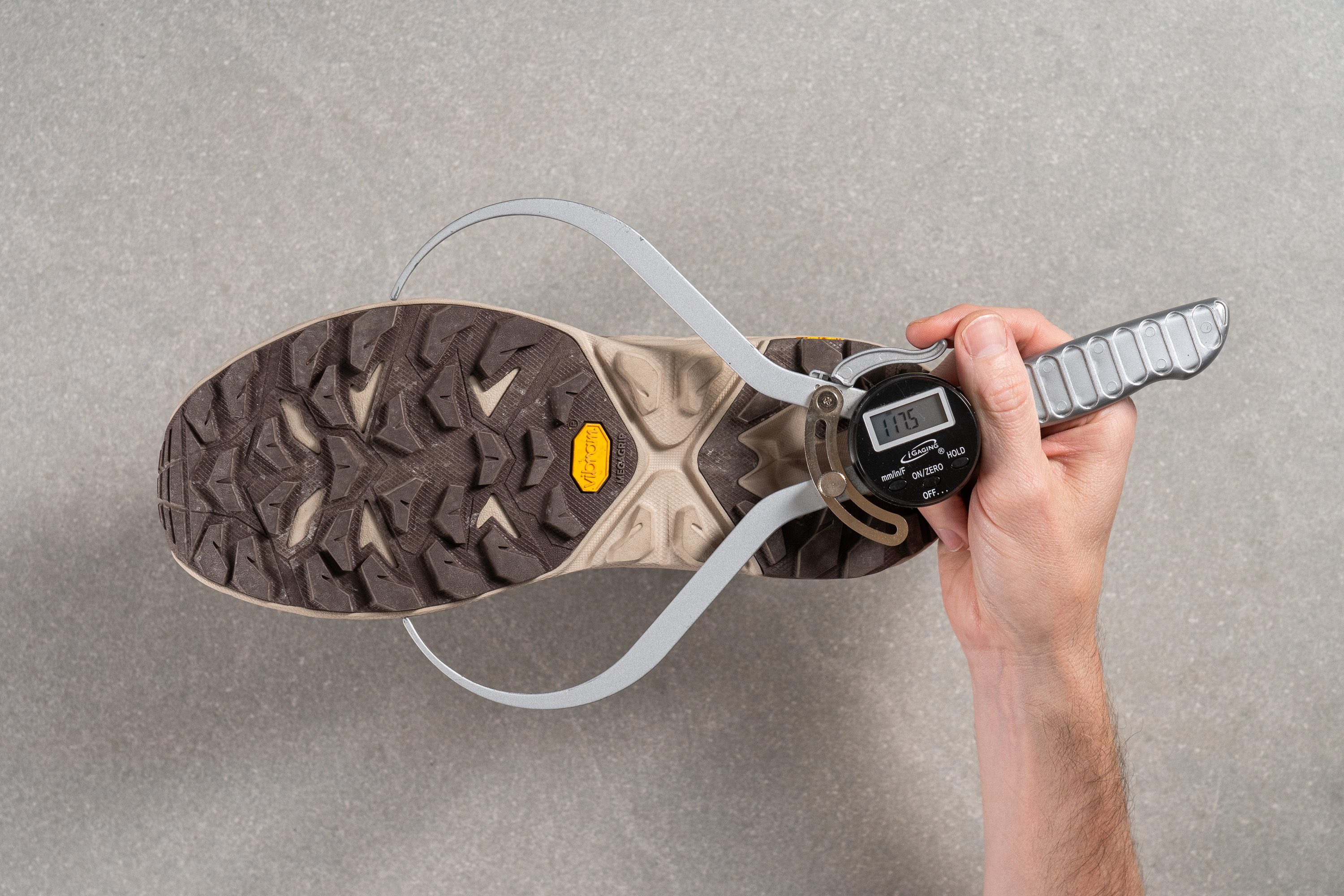
In the widest part of its sole, the Anacapa 2 Low returned an eyebrow-raising reading of 117.5 mm! That's a whole 7 mm wider than average.
| Hoka Anacapa 2 Low GTX | 117.5 mm |
| Average | 111.3 mm |
Midsole width - heel
The shoe's heel also comes in at an above-average width of 91.4 mm.
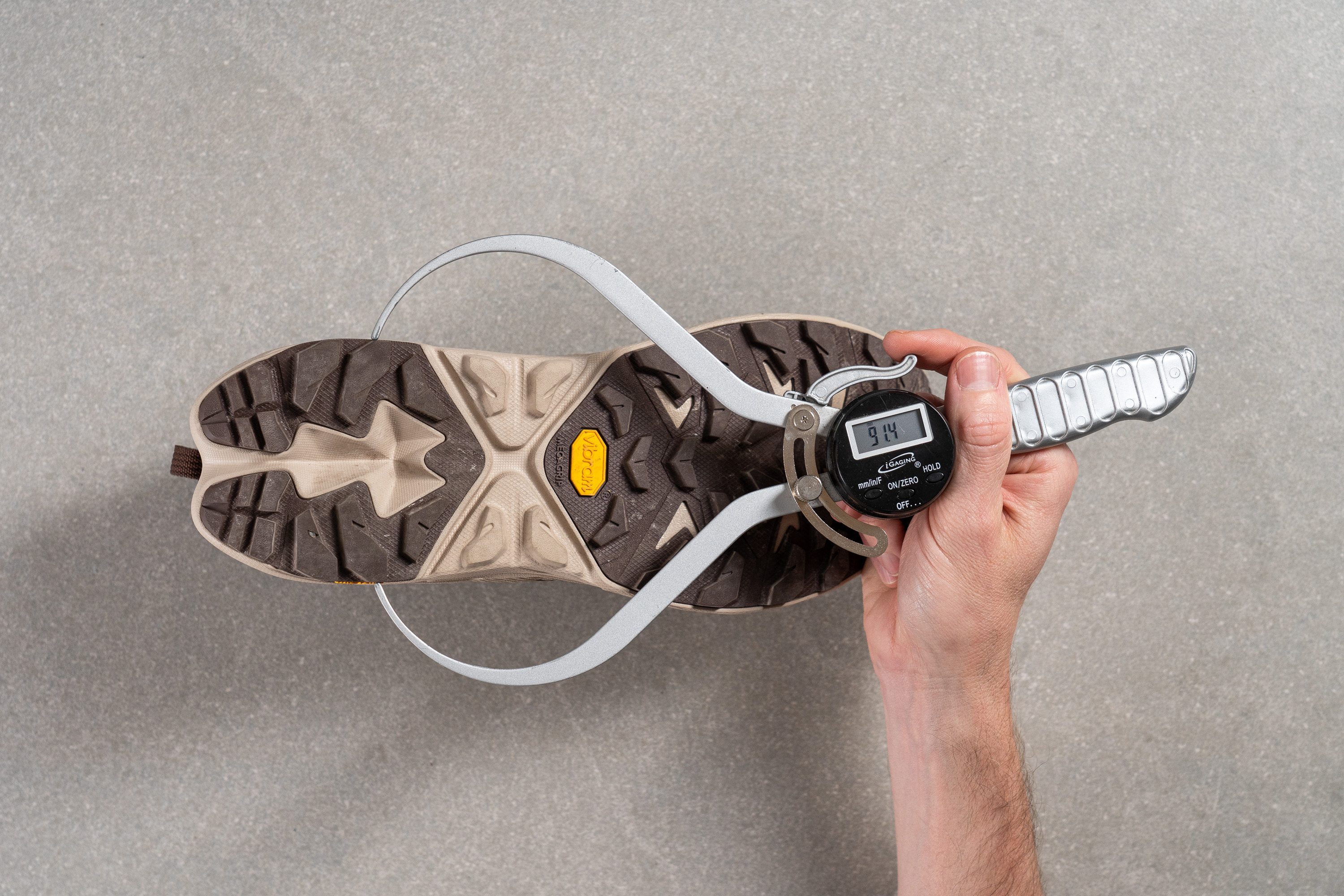
But even before the measurements, we could feel that we were sitting on a bigger platform in the Anacapa 2 Low GTX. While we consider this setup ideal for light and moderately challenging terrain, it surely lacks the maneuverability needed for more technical trails. A more grounded and narrow base of the Salomon X Ultra 4 GTX is much more suitable for that.
| Hoka Anacapa 2 Low GTX | 91.4 mm |
| Average | 87.9 mm |
Durability
Toebox durability
A weak side of any waterproofing membrane is that once it's scratched or torn, its entire water tightness goes down the drain.
In our demanding Dremel test below we check if one of the shoe's most high-wear areas is sufficiently reinforced to prevent that from happening.
After 12 seconds of drilling the Anacapa's mudguard with sandpaper, we are happy to report that its durability has improved over the original shoe. But not significantly.
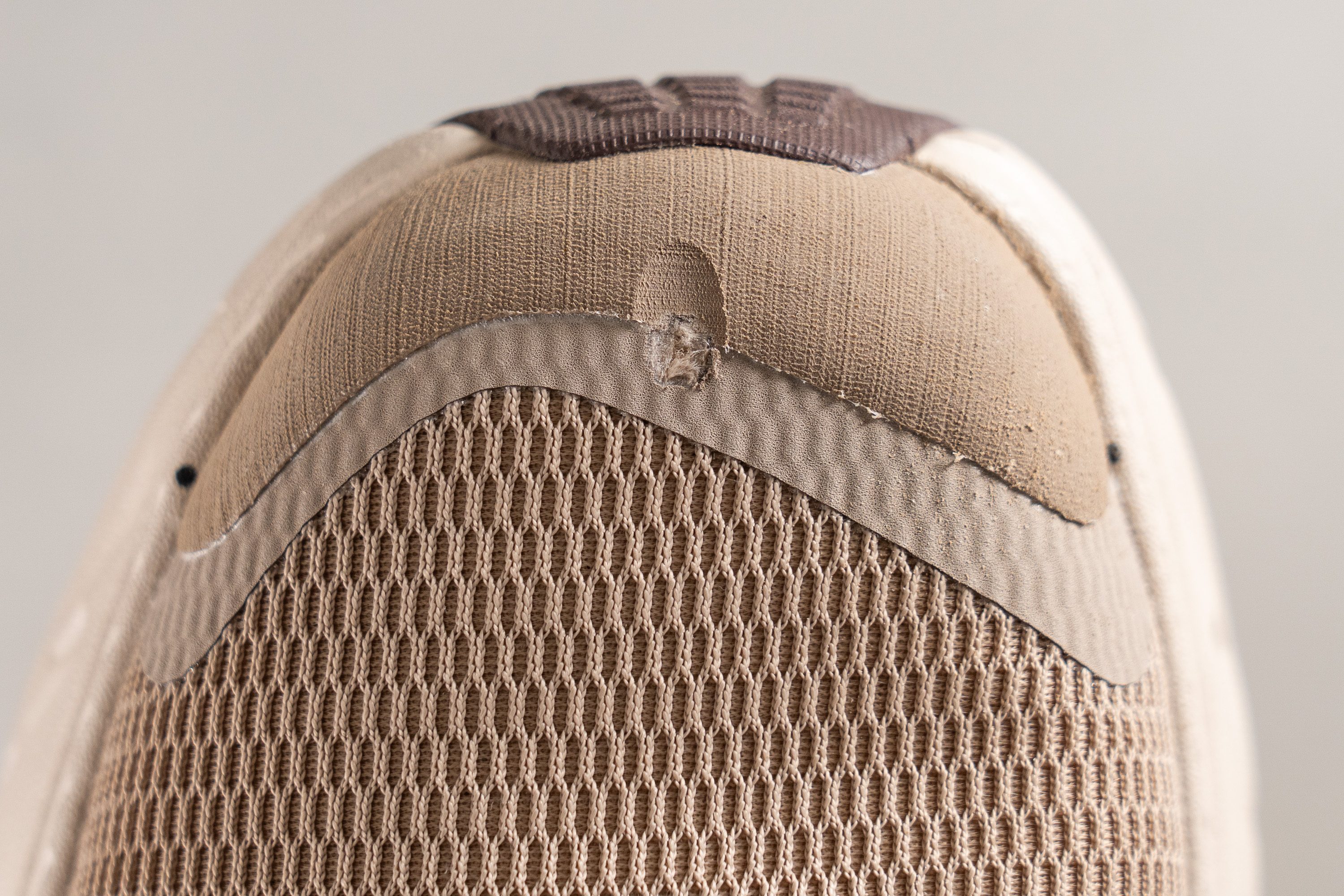
While it's great that the drill didn't get to the fabric, the depth of the dent convinced us to lower its toebox durability score to 3 out of 5. This is below the average for hiking shoes.
| Hoka Anacapa 2 Low GTX | 3 |
| Average | 3.7 |
Heel padding durability
It is equally important to avoid wear and tear inside the shoe if you want to prolong its waterproofing features. But that can be hard to do if the lining itself is not very strong.
Exposing the Anacapa's heel padding to sandpaper for only 4 seconds left some notable scuffing on the material. While the damage is not critical, it is questionable enough to lower the durability score to 3 out of 5.
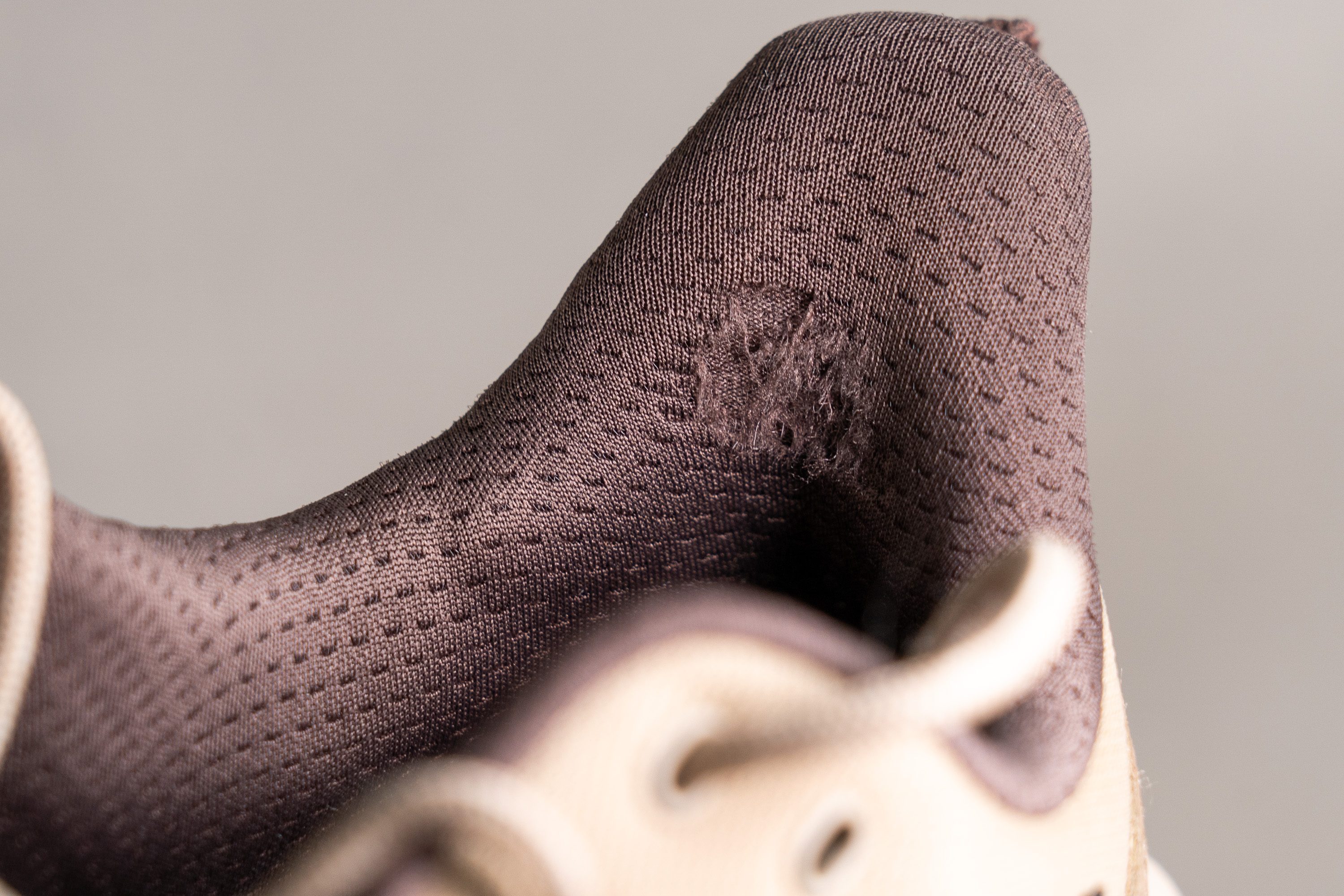
| Hoka Anacapa 2 Low GTX | 3 |
| Average | 3 |
Outsole hardness
The shoe's partially exposed outsole sends mixed signals too.
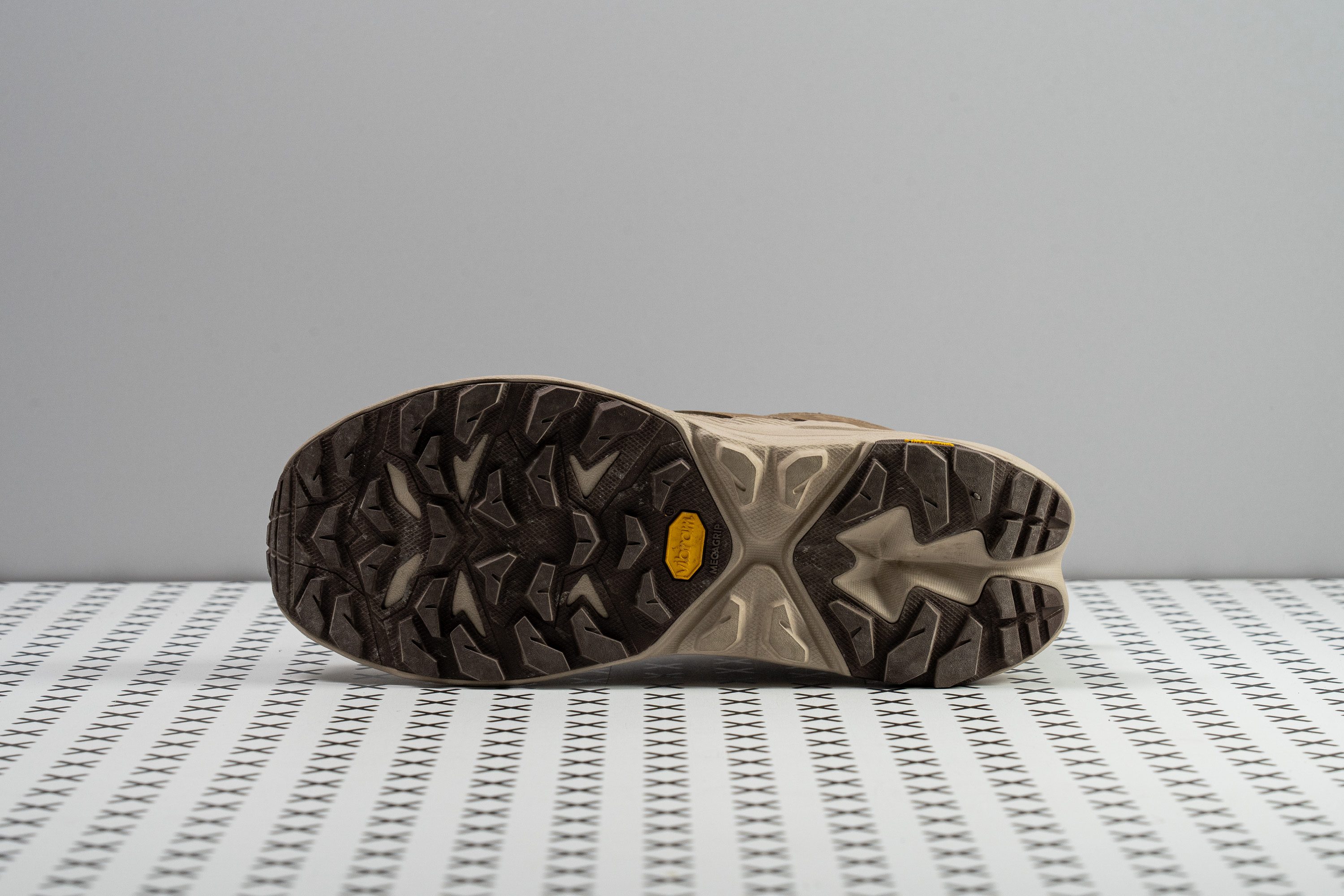
On one hand, we have a pretty sturdy Vibram compound covering the most high-wear areas of the outsole (forefoot and heel). This rubber is hard enough to show a reading of 85.3 HC on our durometer which is on par with the hiking shoe average.
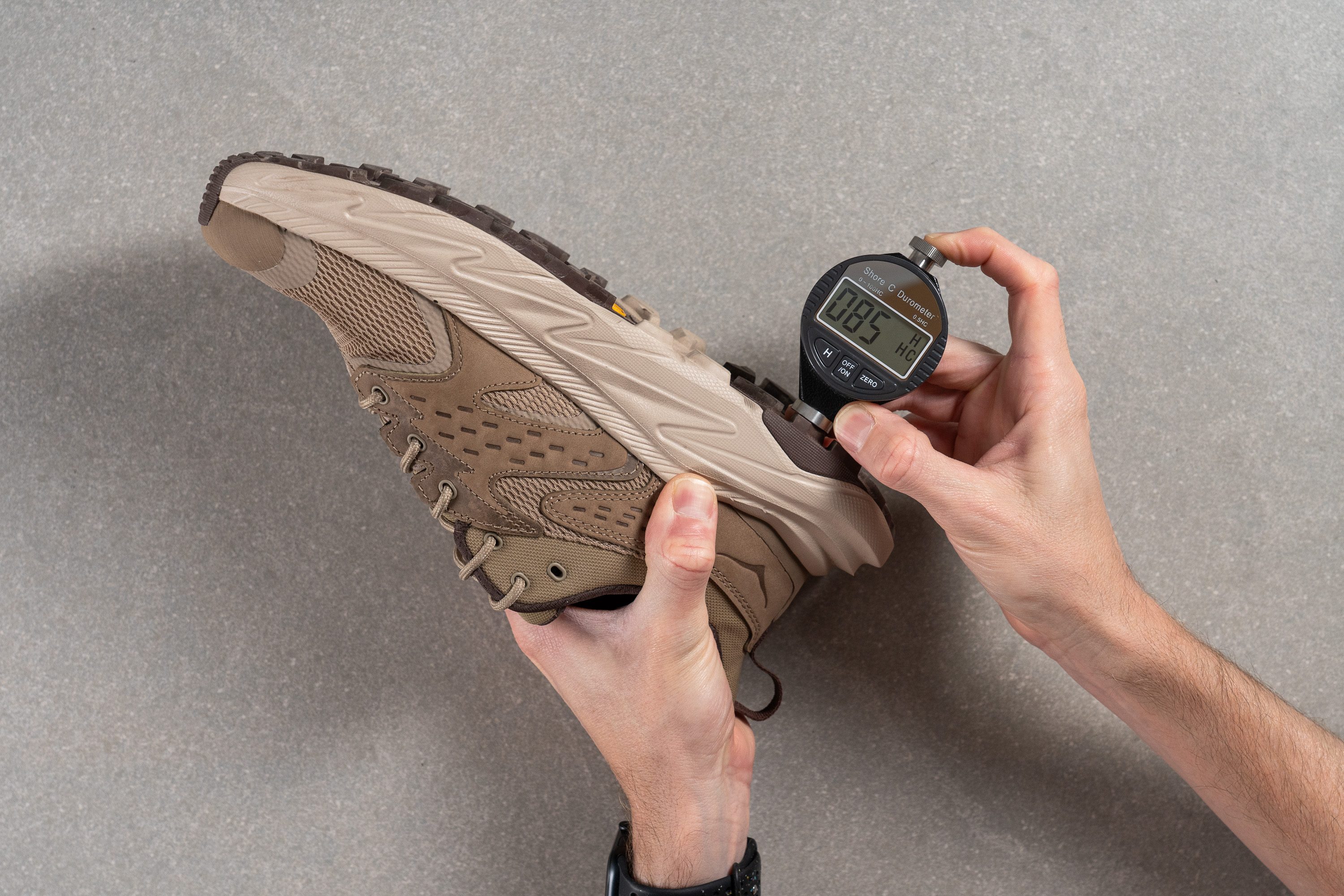
But on the flip side, the midfoot portion of the shoe features exposed foam which is much softer than rubber. Showing a pretty low reading of 52 HC, its longevity is not particularly promising and we expect this area (lugs included) to wear out much faster.
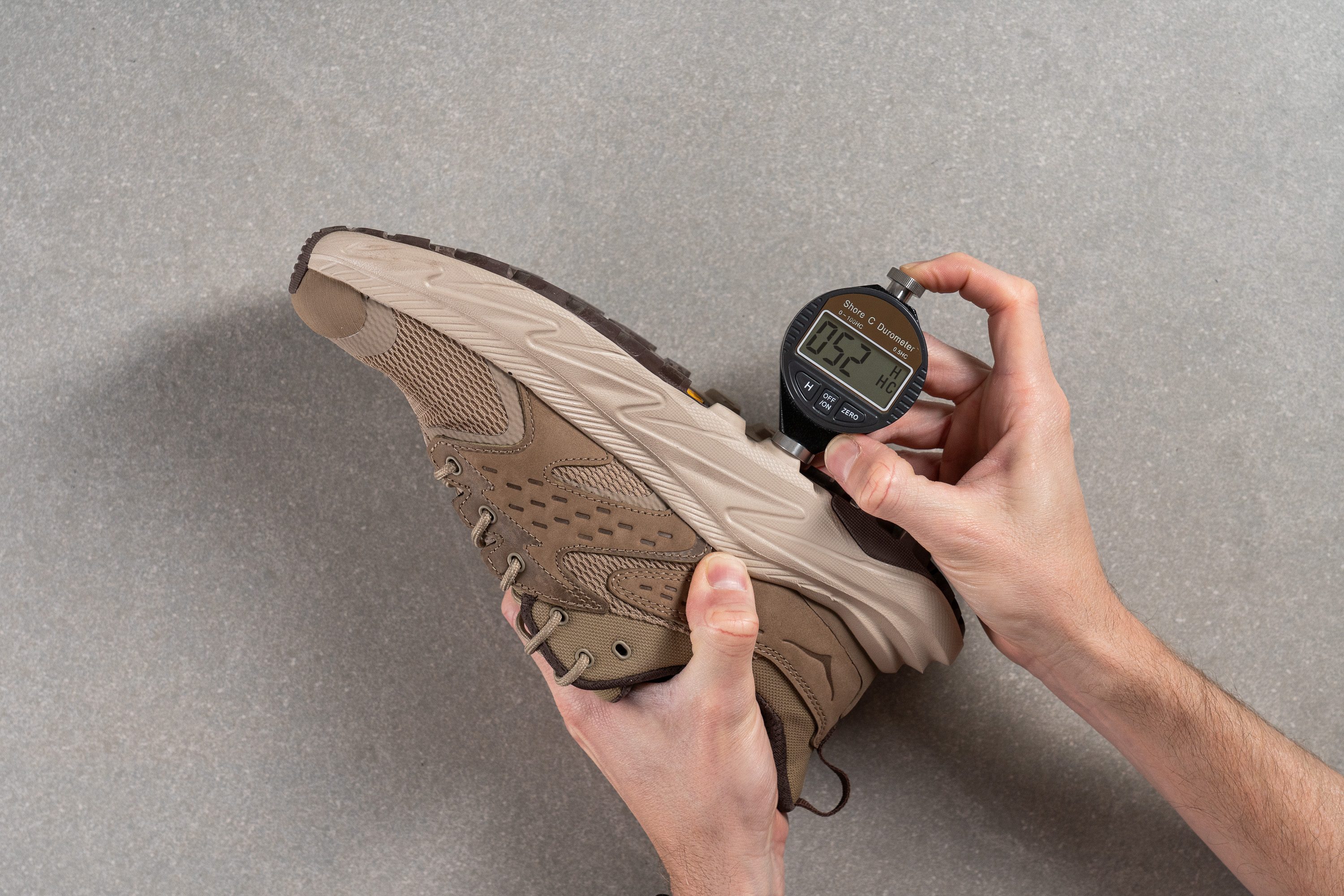
| Hoka Anacapa 2 Low GTX | 85.3 HC |
| Average | 85.1 HC |
Outsole durability
However, the rubberized parts of the shoe's outsole are not so concerning. Our 22-second drilling session proved that this Vibram rubber is ready to log hundreds of trail miles.
Using a tread gauge, we measured as little as 1.0 mm of damage in the shoe's rubber. This minor tread loss is typical for hiking shoes.
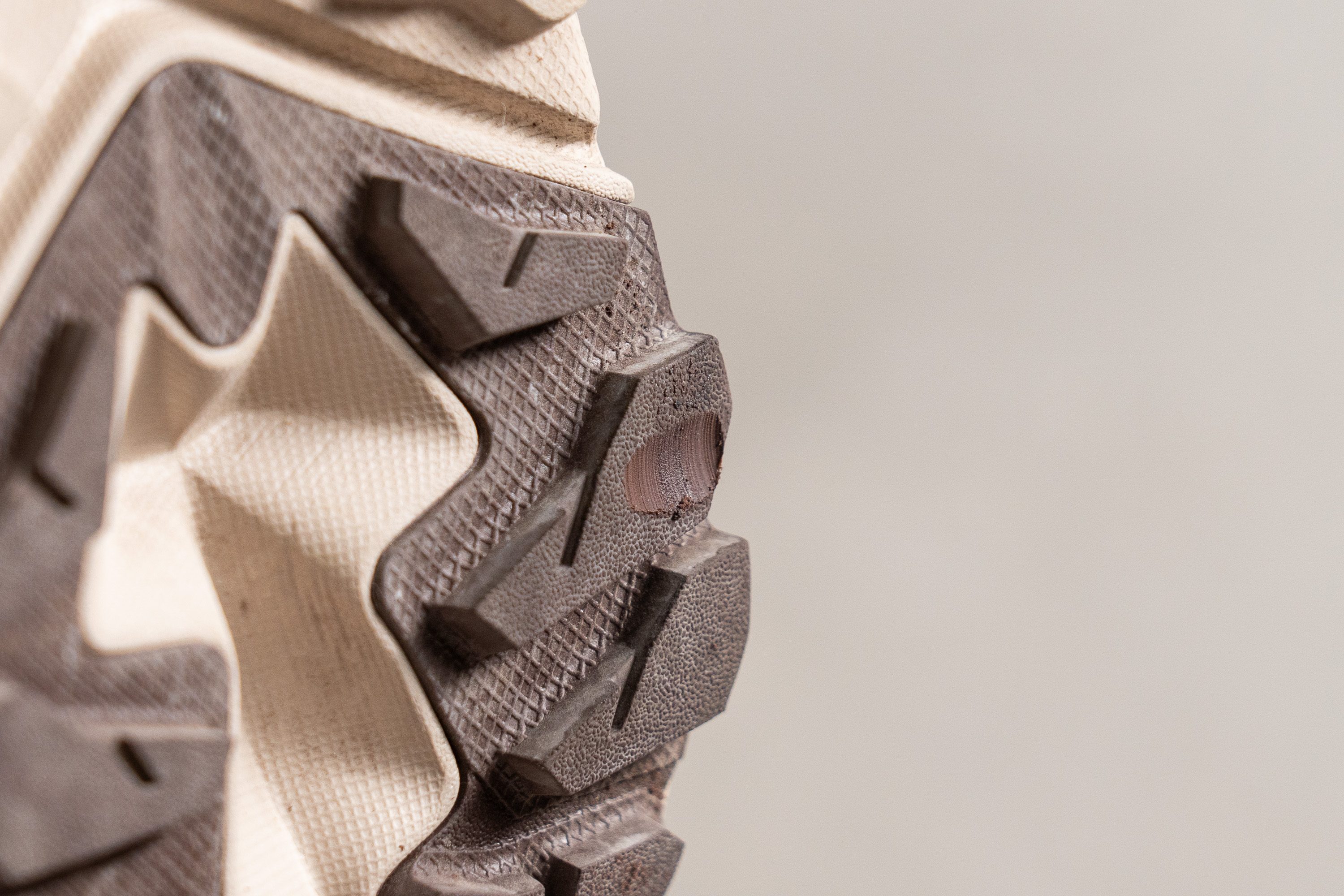
| Hoka Anacapa 2 Low GTX | 1.0 mm |
| Average | 1.0 mm |
Outsole thickness
We also found that the Anacapa 2 Low GTX features a solid amount of rubber to protect the midsole. Our caliper showed 2.1 mm of rubber thickness excluding the 4.9 mm lugs.
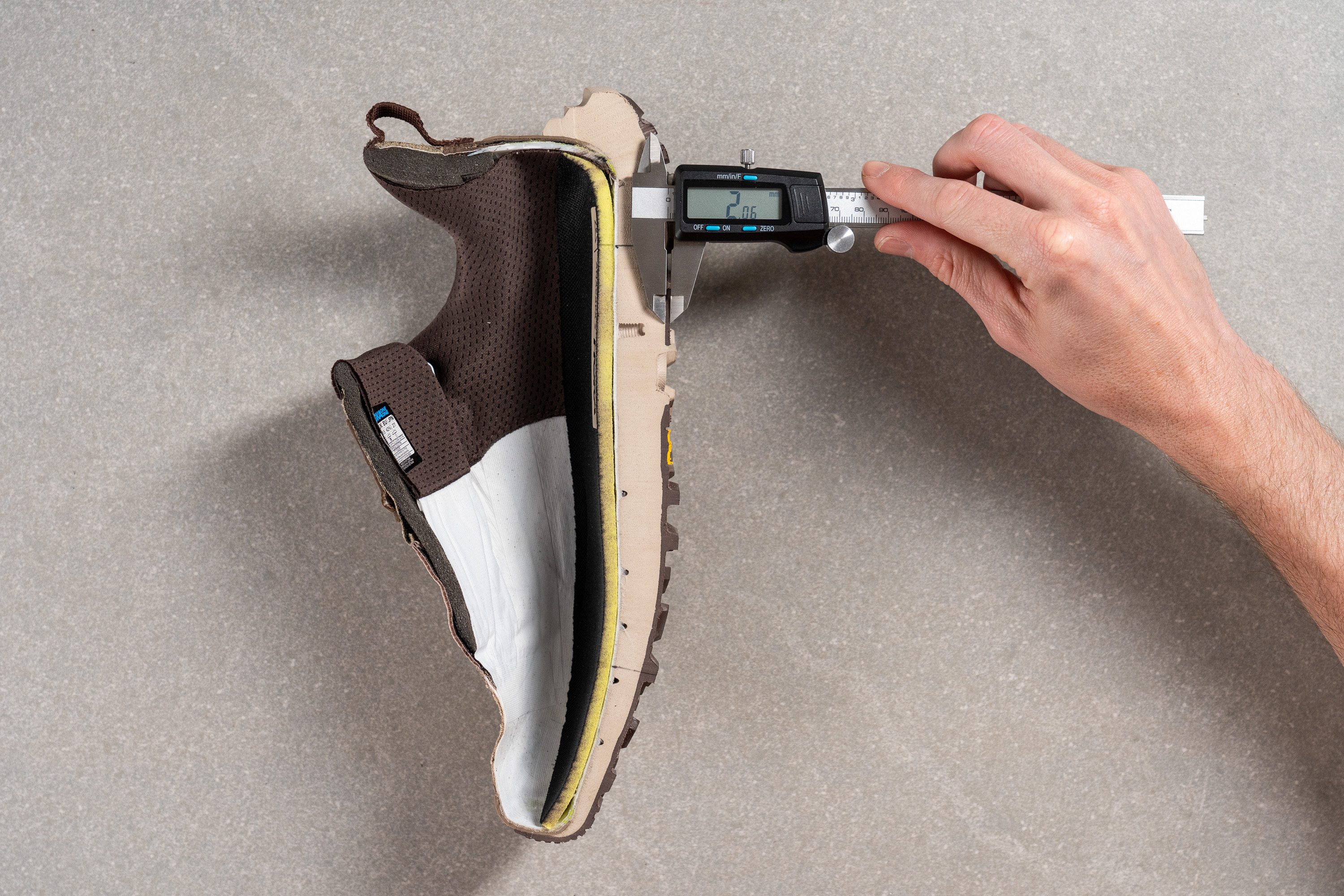
All things considered, we expect the rubberized parts of the shoe's outsole to last just as much as the average hiking shoe. However, we also anticipate some premature wear of the exposed foam.
| Hoka Anacapa 2 Low GTX | 2.1 mm |
| Average | 2.5 mm |
Misc
Insole thickness
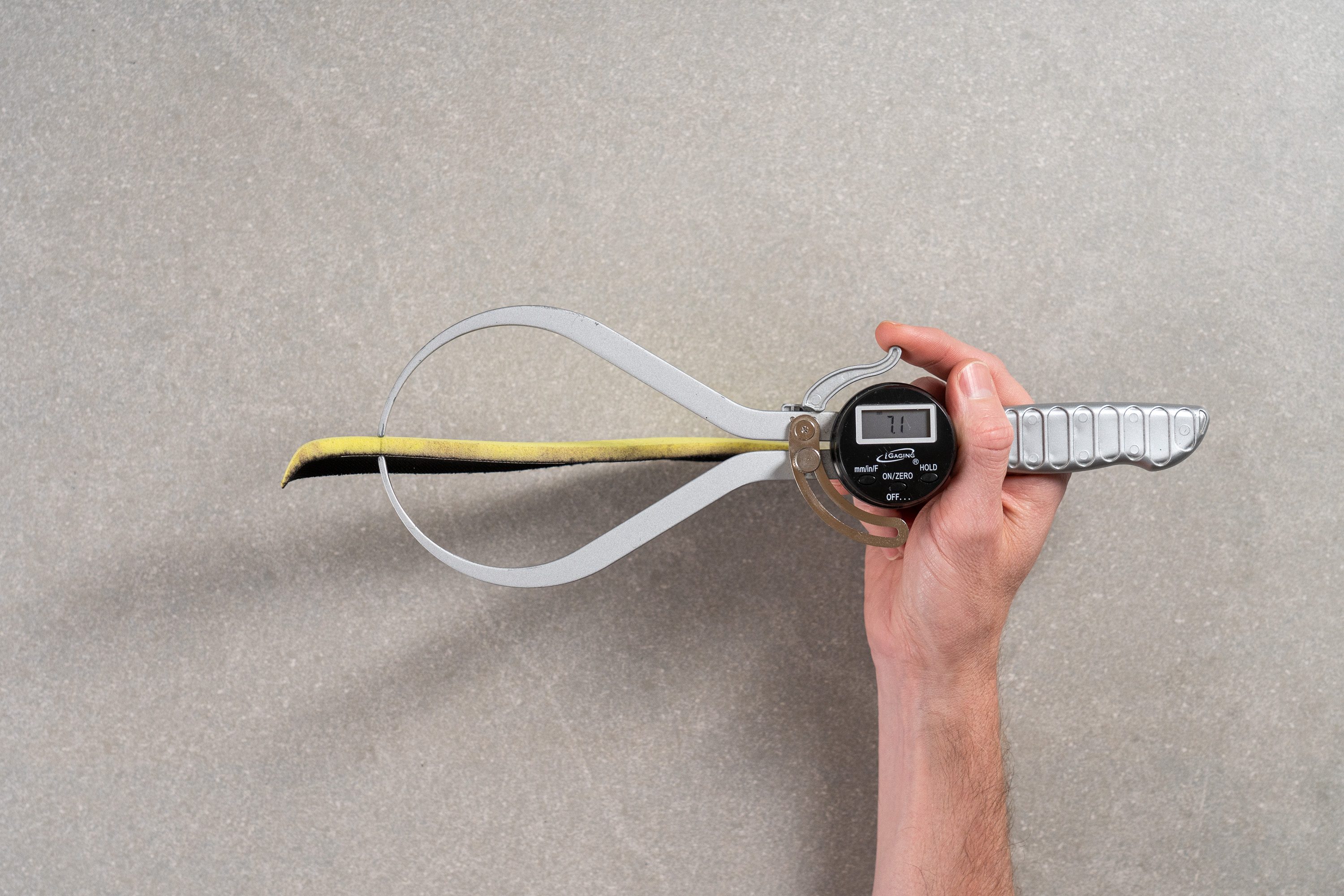
| Hoka Anacapa 2 Low GTX | 7.1 mm |
| Average | 5.3 mm |
Removable insole
The shoe's stock insole is removable but if you choose to replace it, keep in mind that it is thicker than average and swapping it for a thinner one will create more in-shoe space.
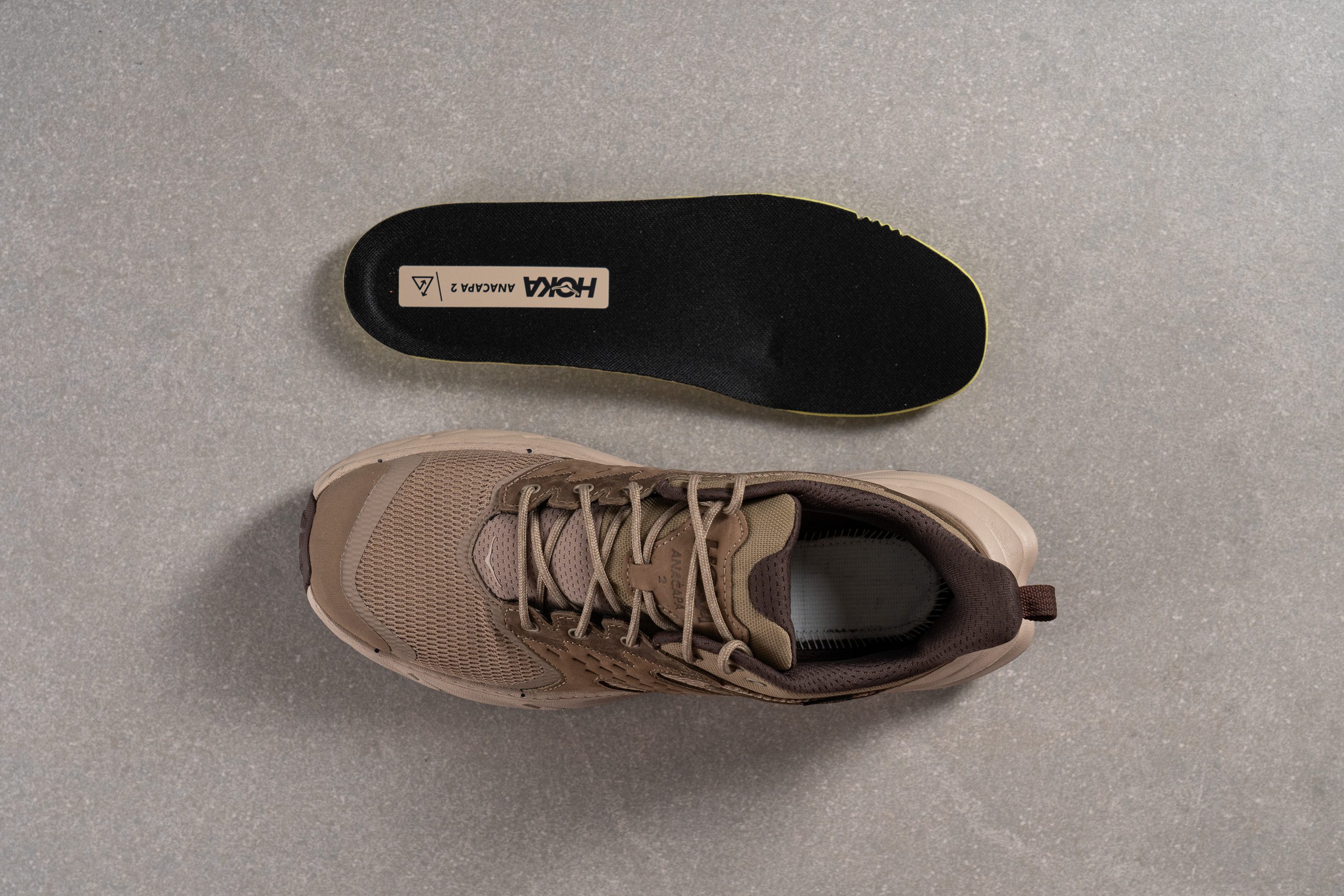
| Hoka Anacapa 2 Low GTX | Yes |
Midsole softness in cold (%)
Unfortunately, once the clock strikes midnight... Um, meaning once the thermometer shows low temperatures, the Hoka Anacapa 2 Low GTX starts to lose its magic softness.
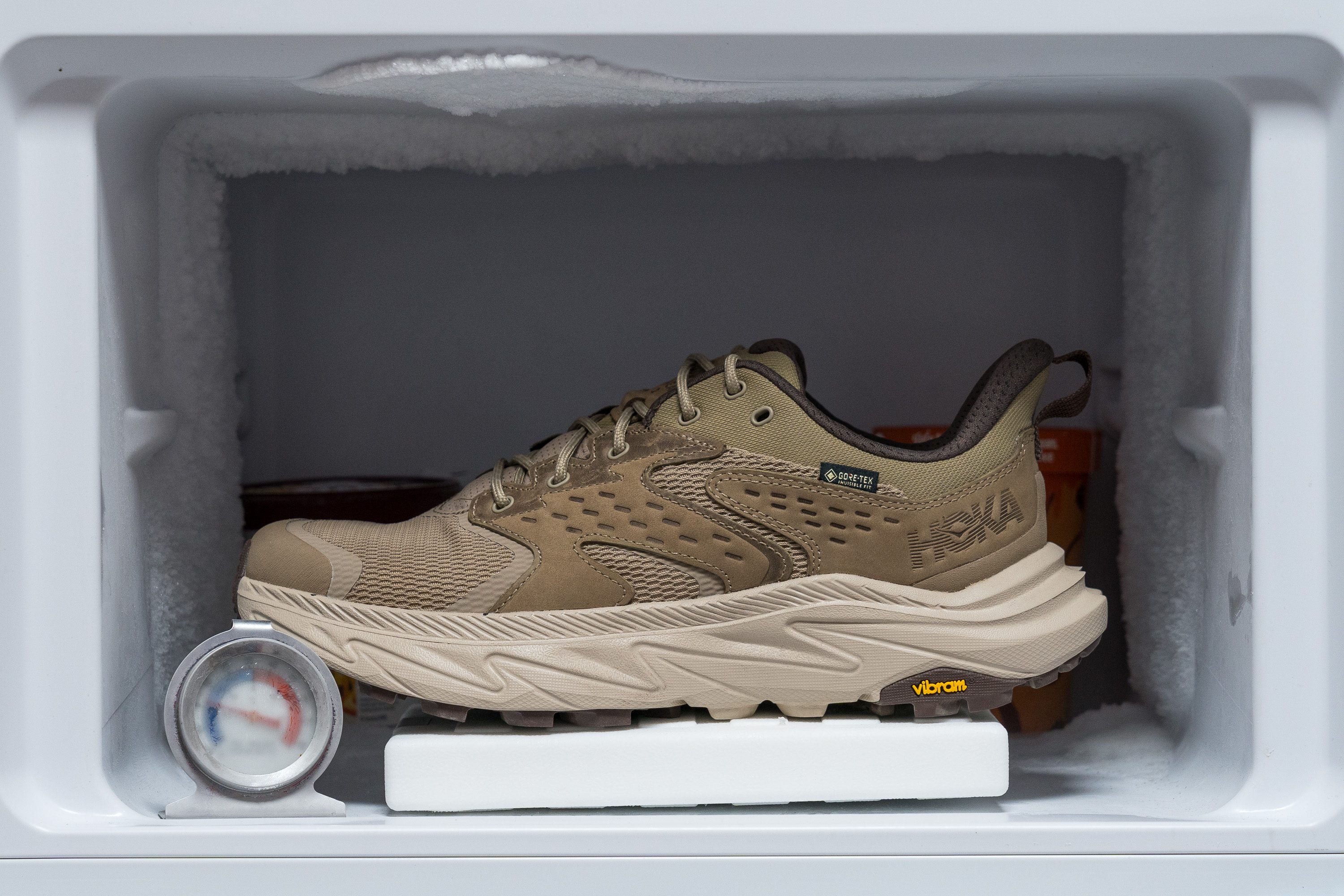
To mimic a chilly night outdoors, we kept the shoe in the freezer for 20 minutes and measured its midsole softness once again.
The durometer reading went from the balanced reading of 22.1 HA to the firm one of 28.3 HA which means that the shoe has firmed up by 27.7%! The change was significantly more drastic than the average 18% which means that the Anacapa will require some "defrosting" before its midsole warms up to the inherent softness.
| Hoka Anacapa 2 Low GTX | 28% |
| Average | 19% |
Reflective elements
This Hoka shoe doesn't have any reflective elements to keep you visible at night.
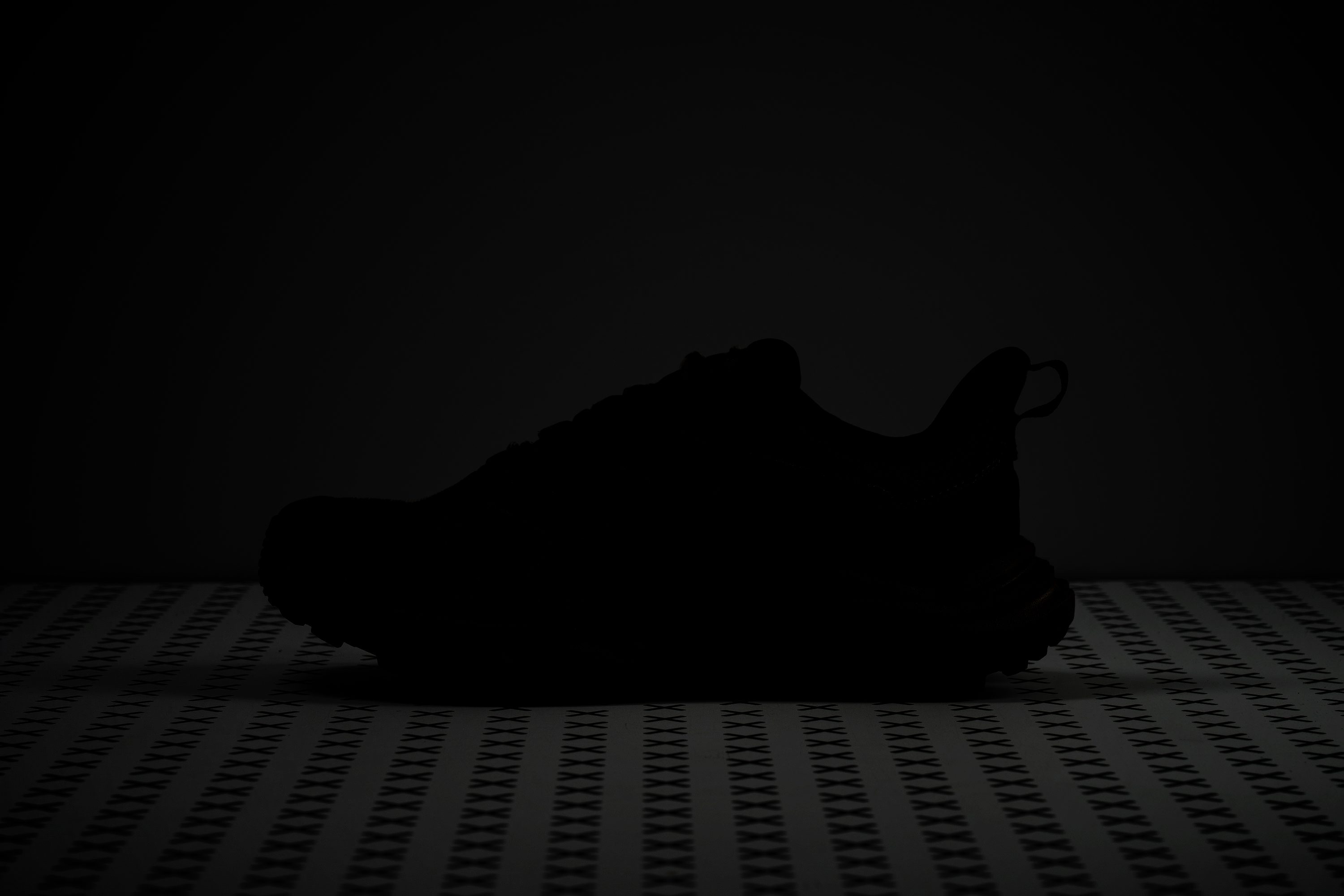
| Hoka Anacapa 2 Low GTX | No |
Tongue padding
The tongue of this Hoka shoe packs a generous amount of foam. Measuring its thickness with a caliper returned 10.5 mm which is a bit puffier compared to average.
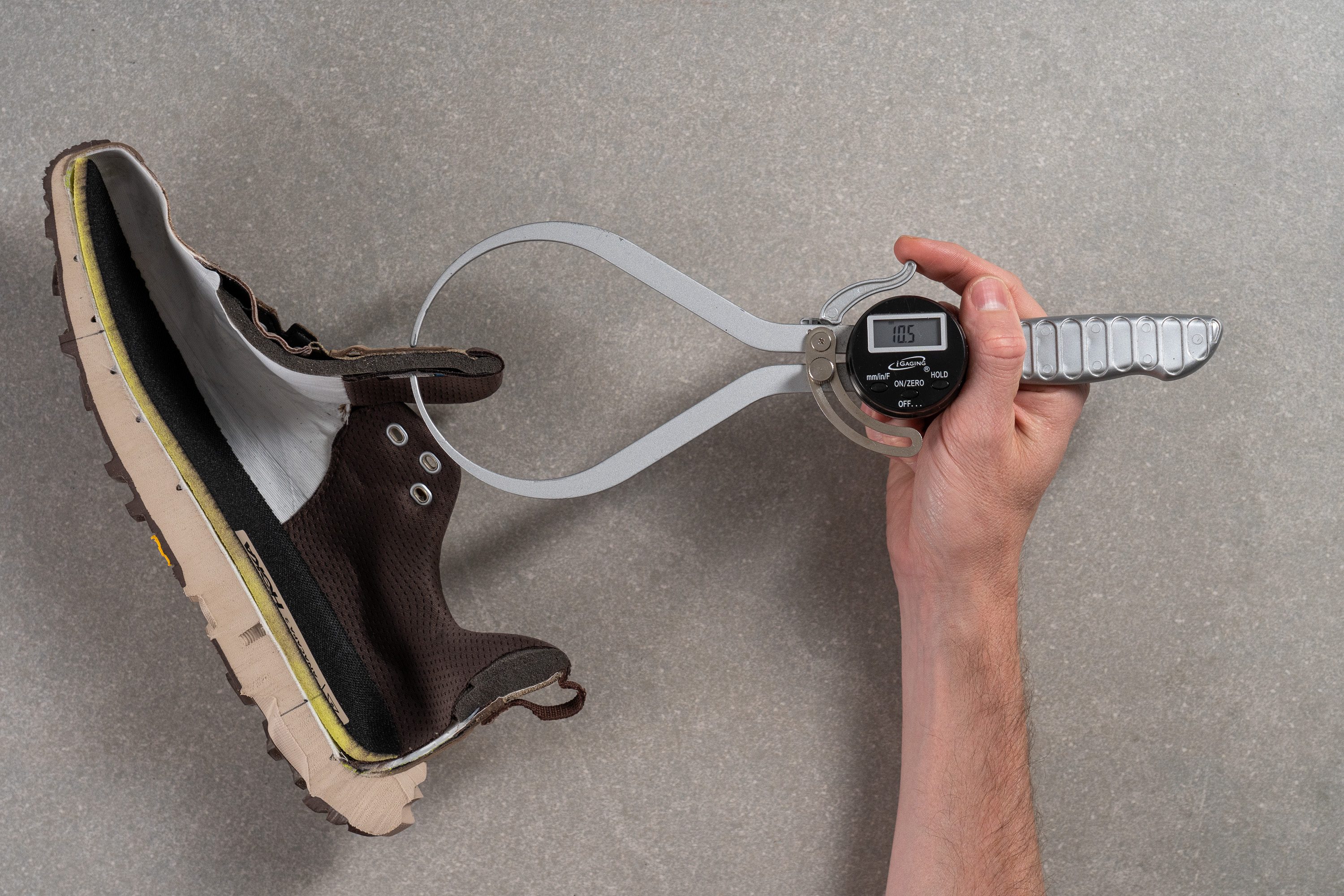
| Hoka Anacapa 2 Low GTX | 10.5 mm |
| Average | 10.2 mm |
Tongue: gusset type

Price
The asking price of Hoka shoes tends to be slightly higher than the average but considering the comfort and quality of their products, we can't really complain.
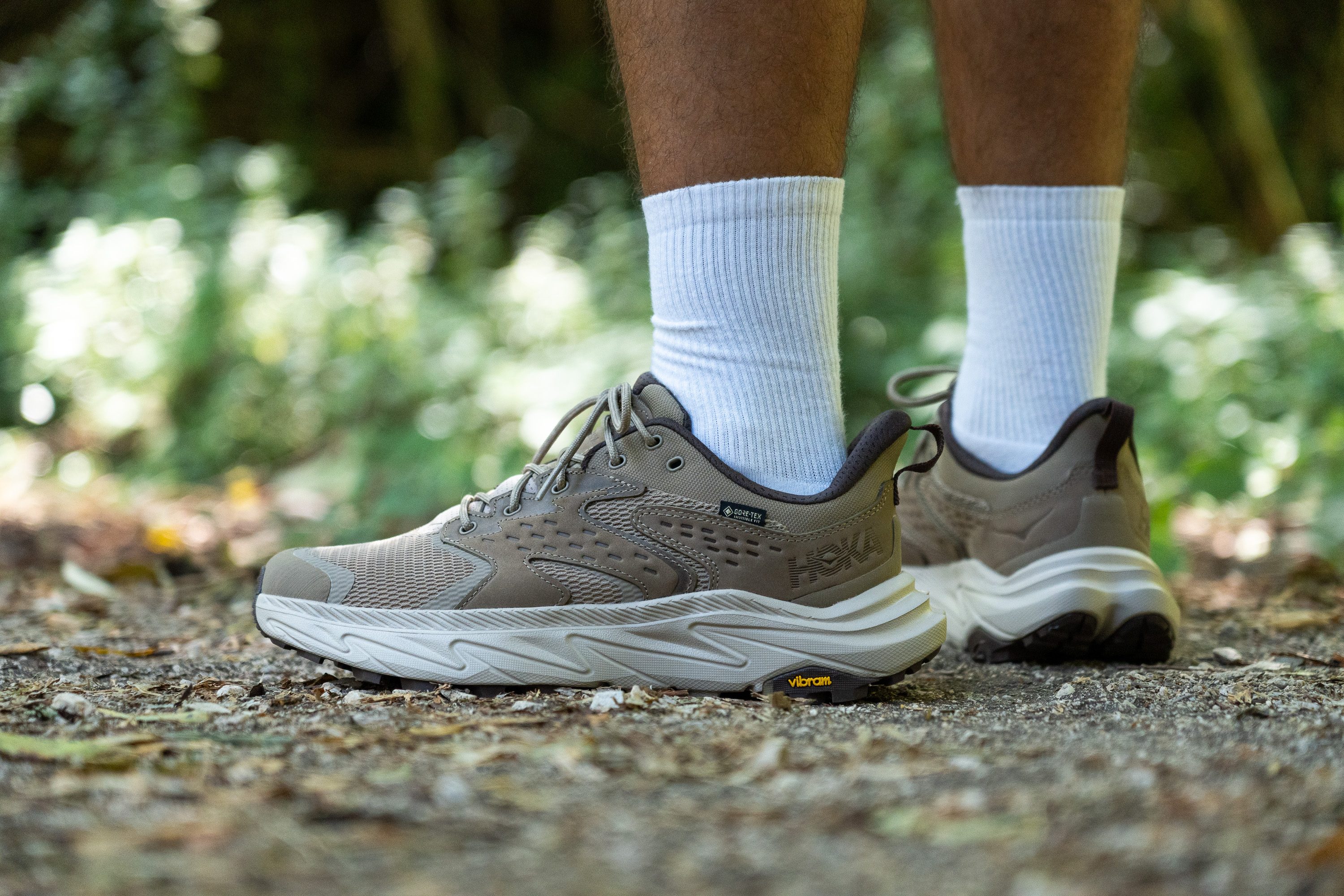
Even though the second edition of the Anacapa Low saw a slight price hike over the first version, we find it quite reasonable for a hiking shoe with so much cushioning, support, GTX waterproofing, and high-quality nubuck leather.
| Hoka Anacapa 2 Low GTX | $180 |
| Average | $151 |
Heel tab
We found the large finger loop at the back of the shoe very helpful for on-and-off.
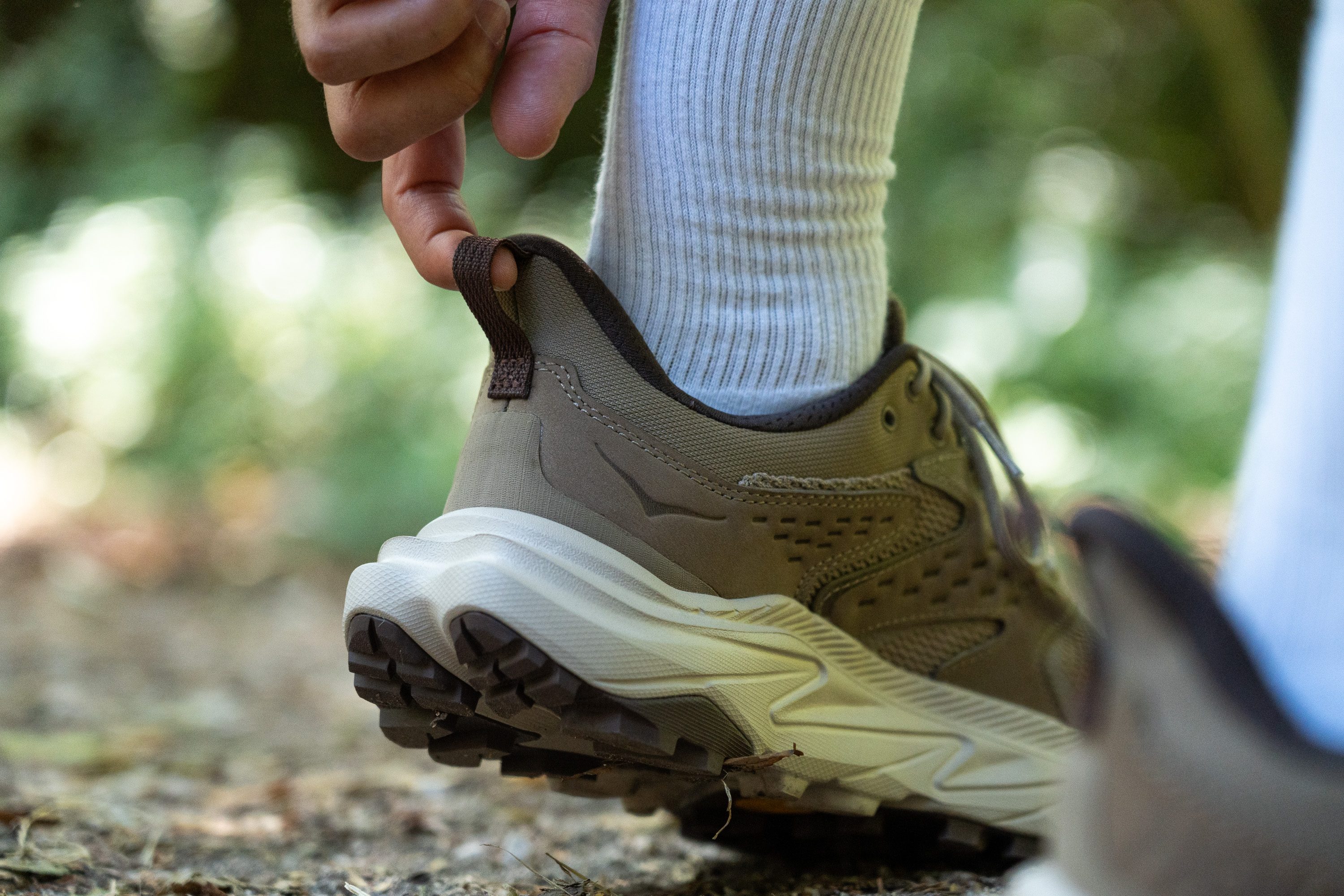
| Hoka Anacapa 2 Low GTX | Finger loop |
Sustainable materials
It seems like Hoka incorporates more and more ethically sourced materials into each new shoe release. In this version of the Anacapa, we see quite a few sustainable components including:
- 70% recycled polyester face fabric in the Gore-Tex Invisible Fit
- Sugarcane EVA midsole
- 100% recycled vamp and quarter mesh
- 50% Soybean-based sockliner
- 100% Recycled polyester collar and tongue lining mesh
- 100% Recycled polyester external collar mesh
- 100% Recycled polyester laces (excluding aglet)

